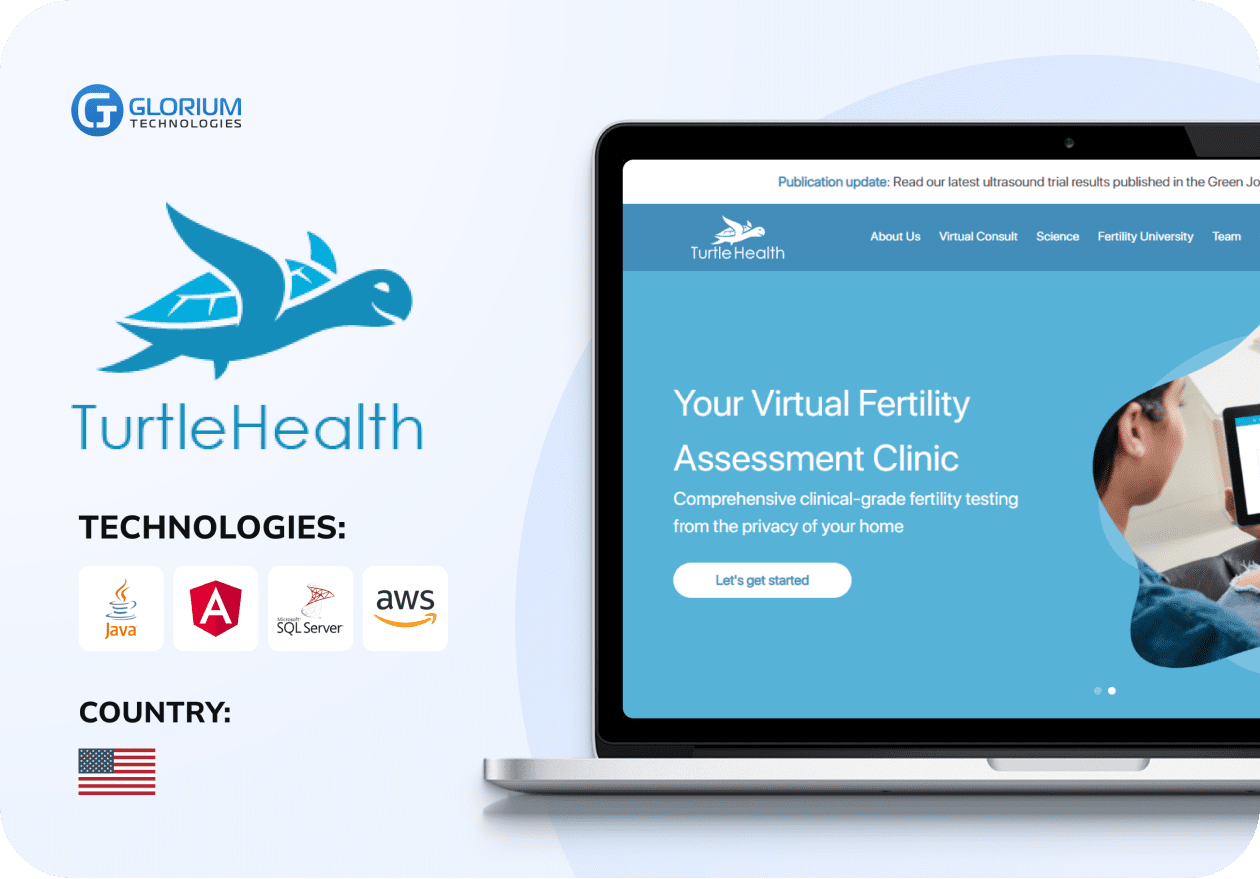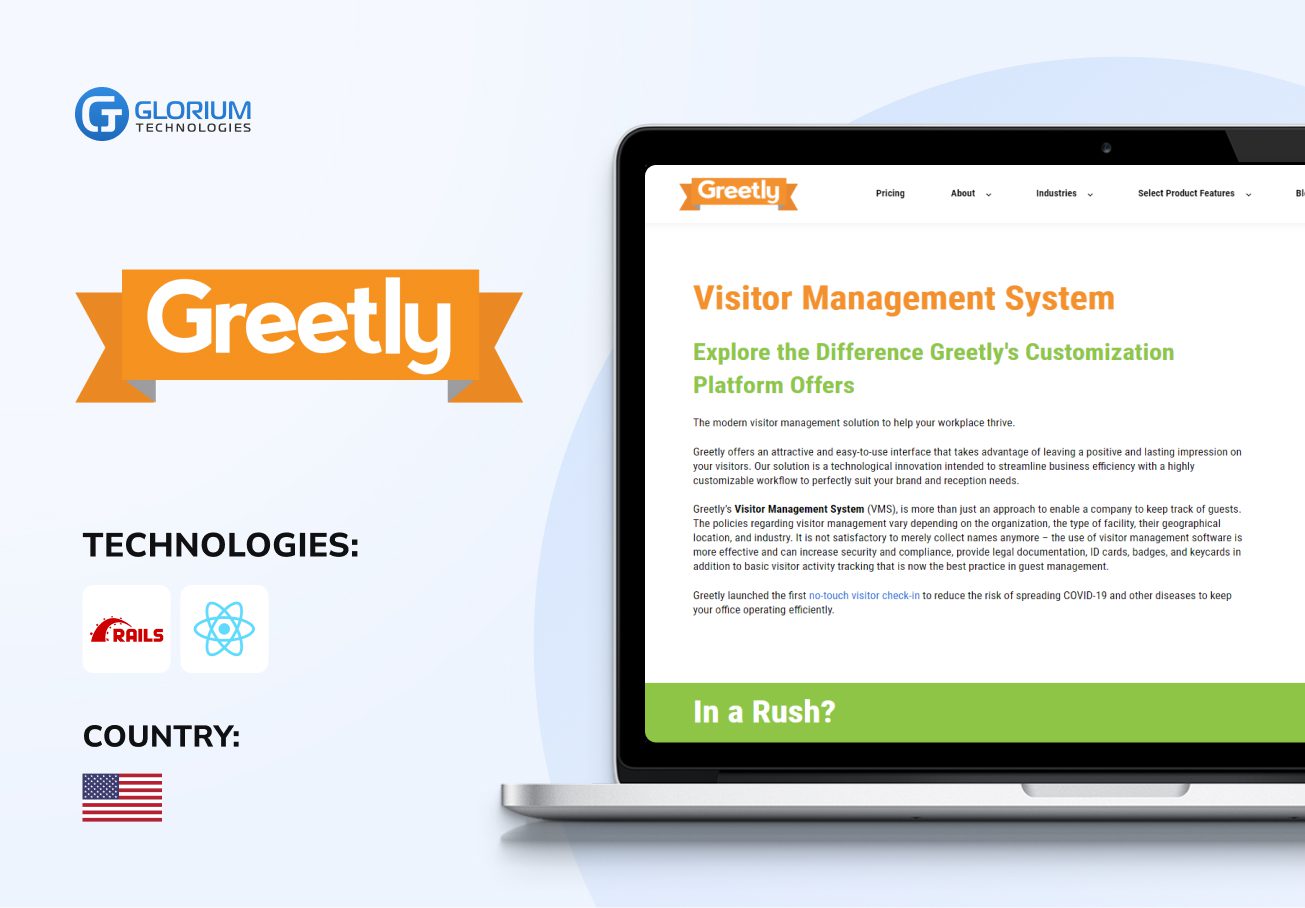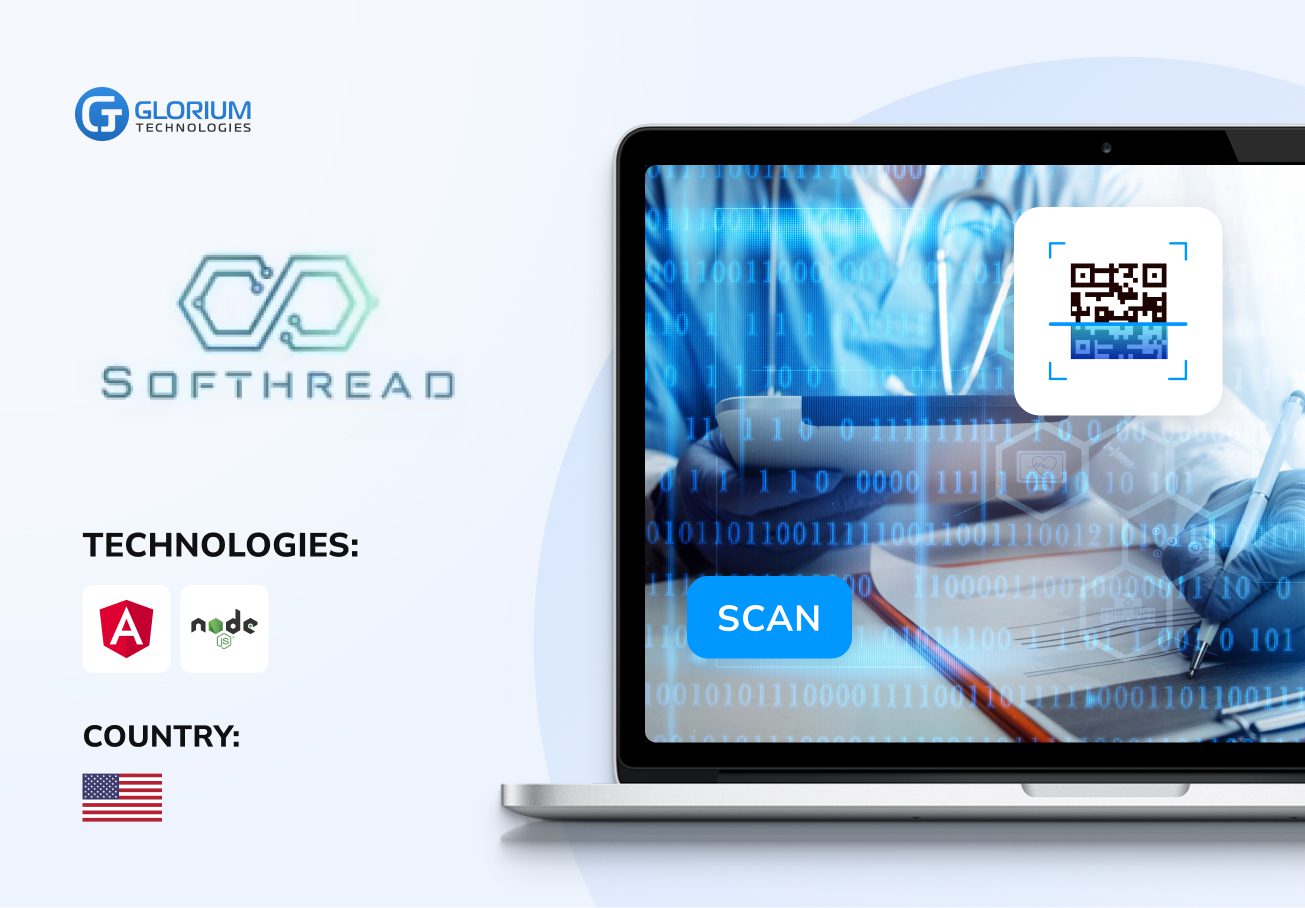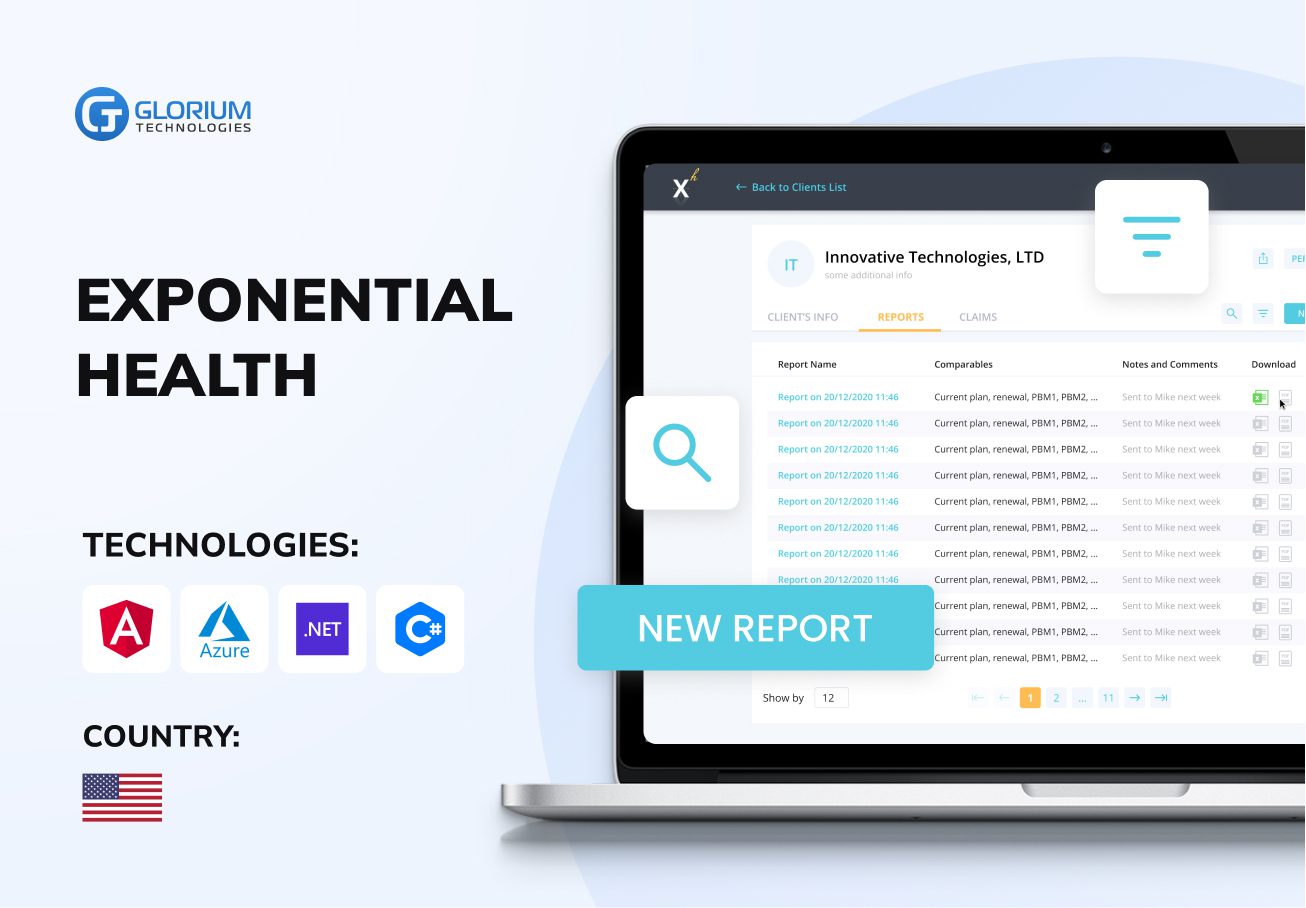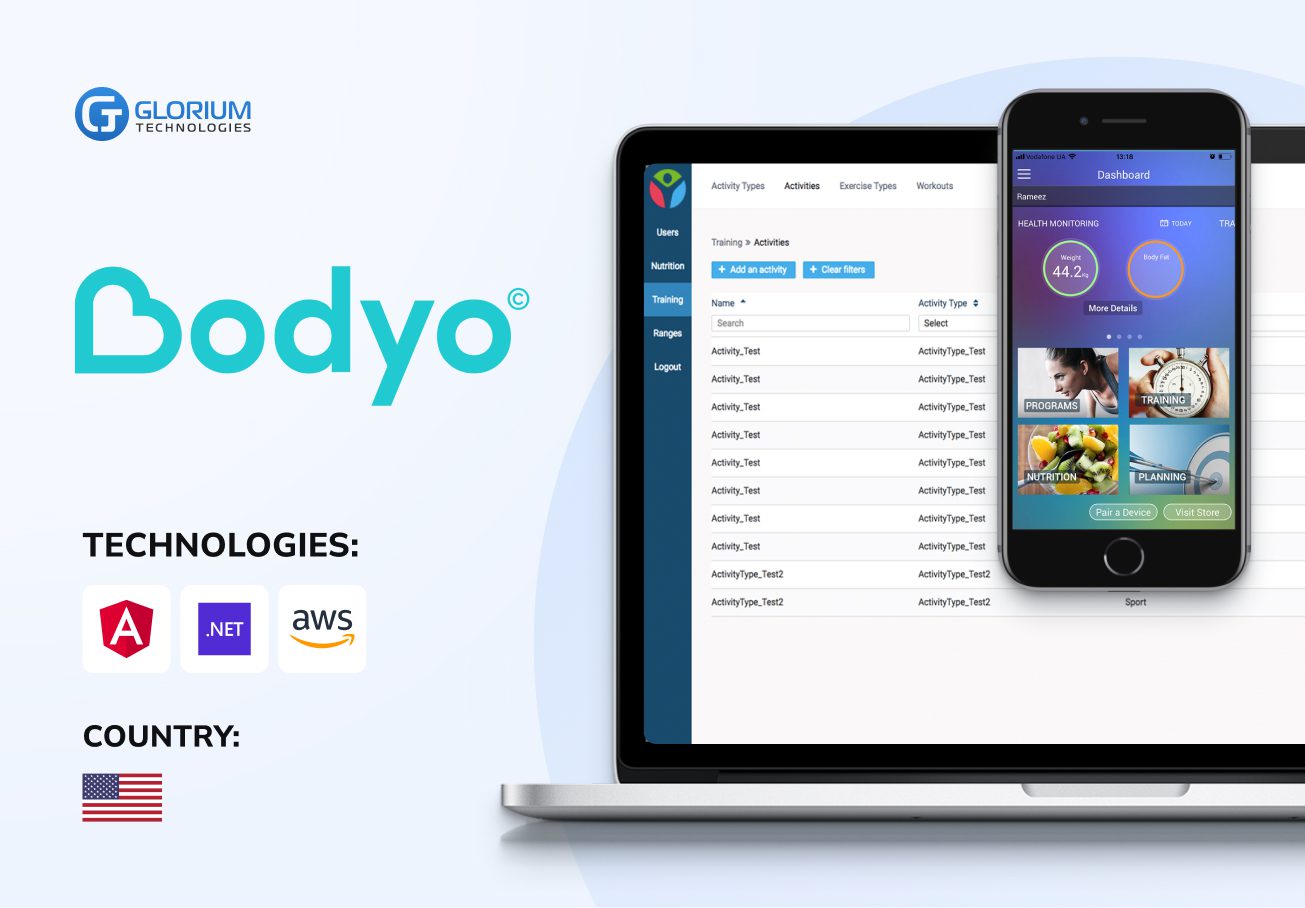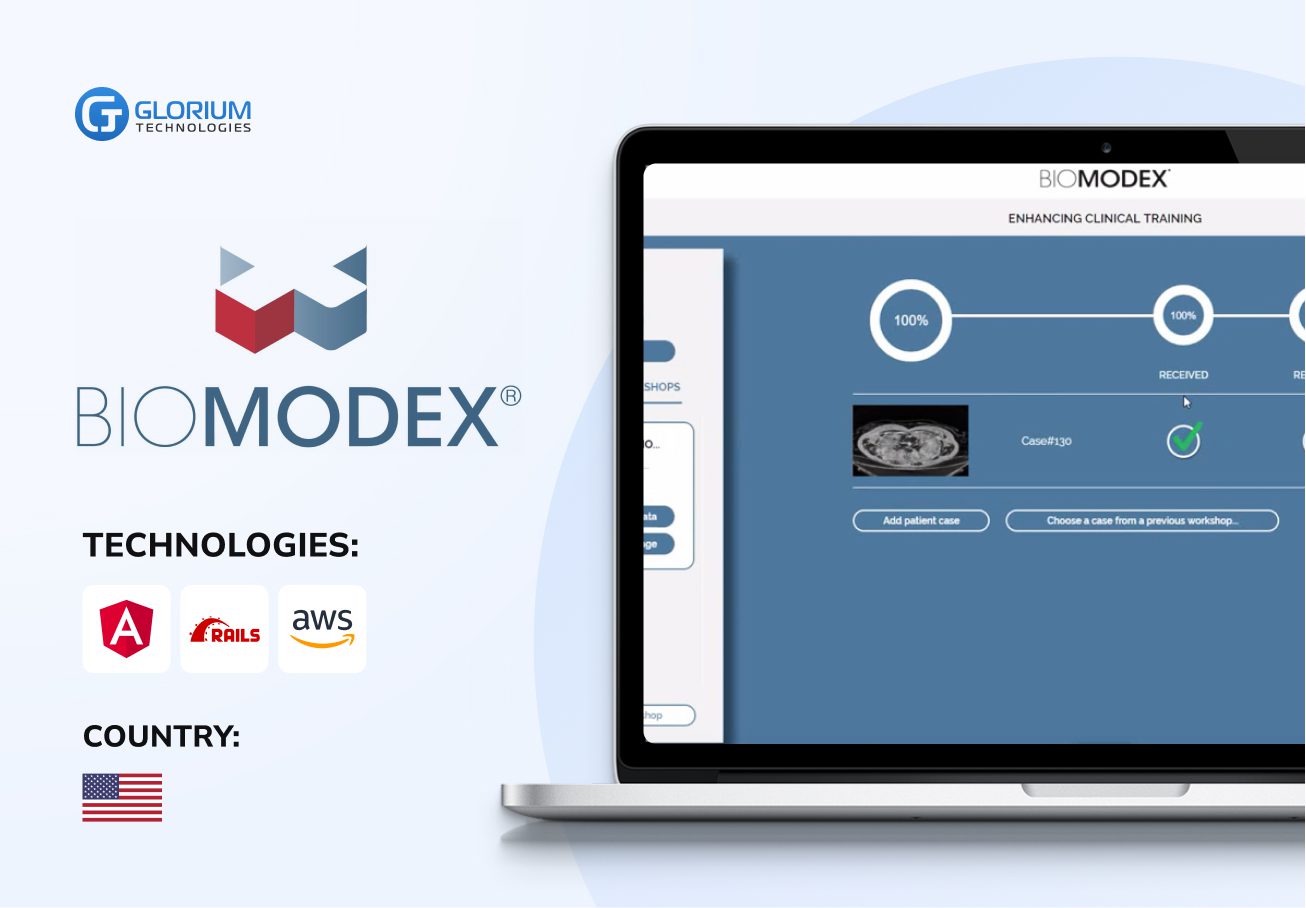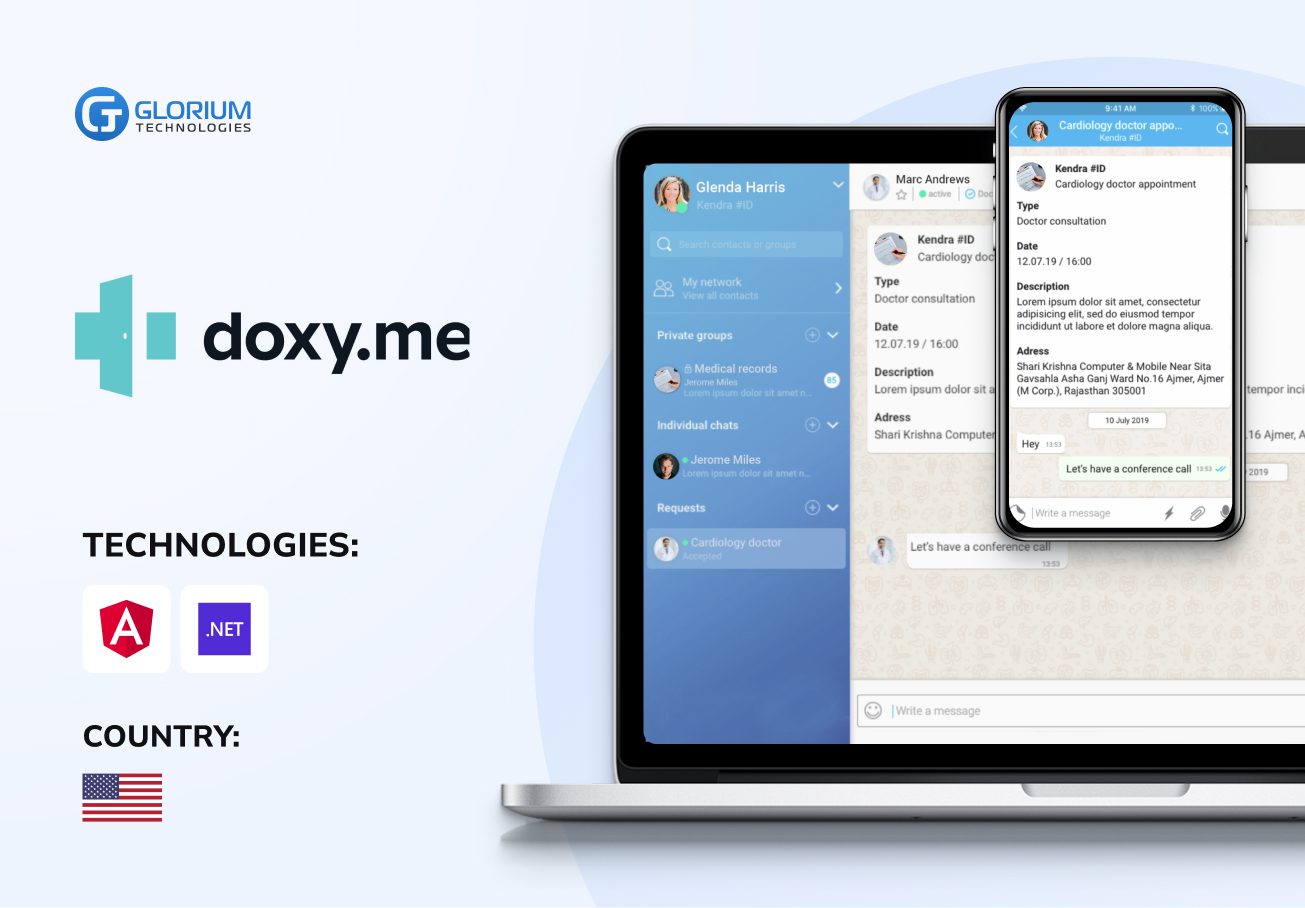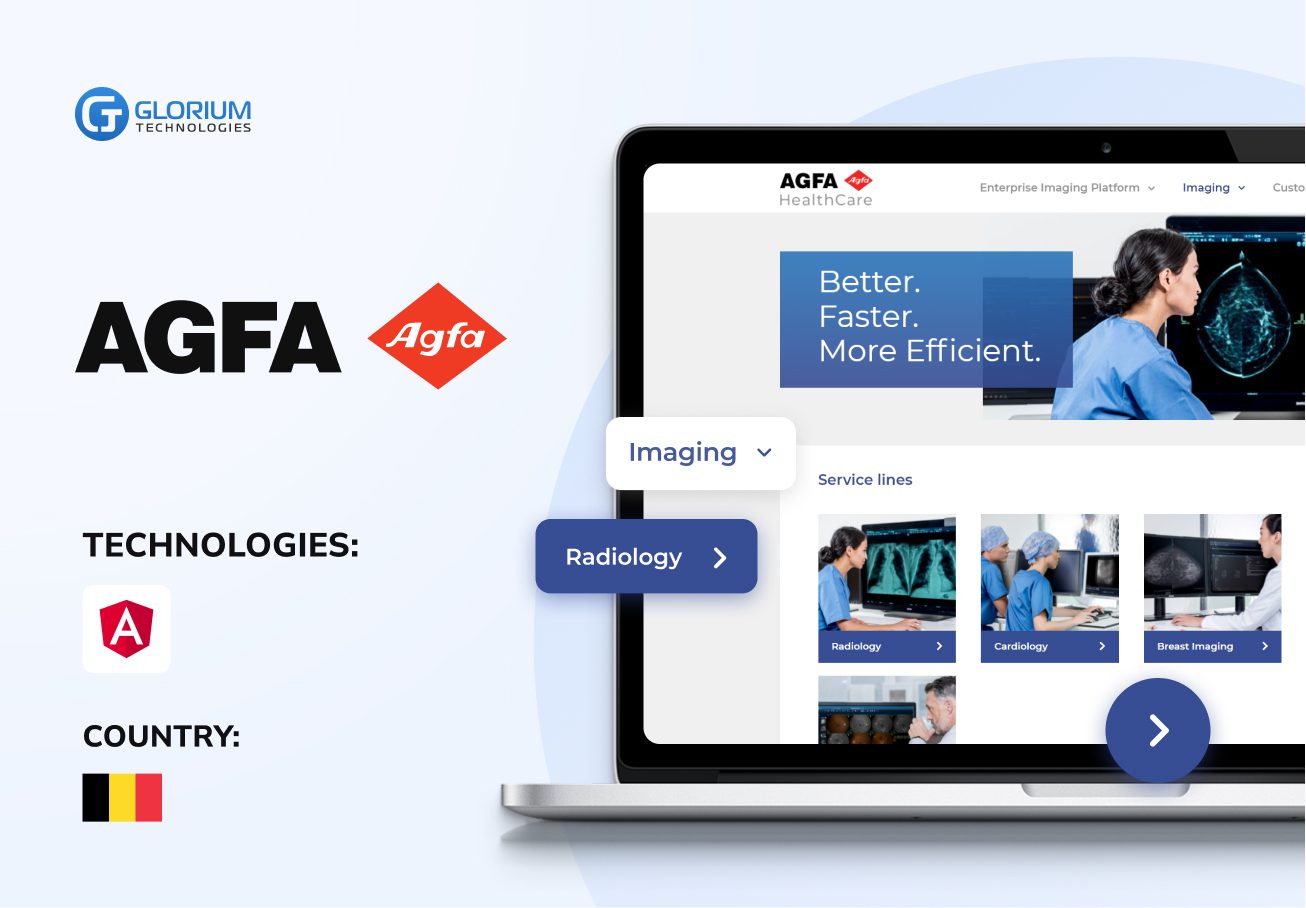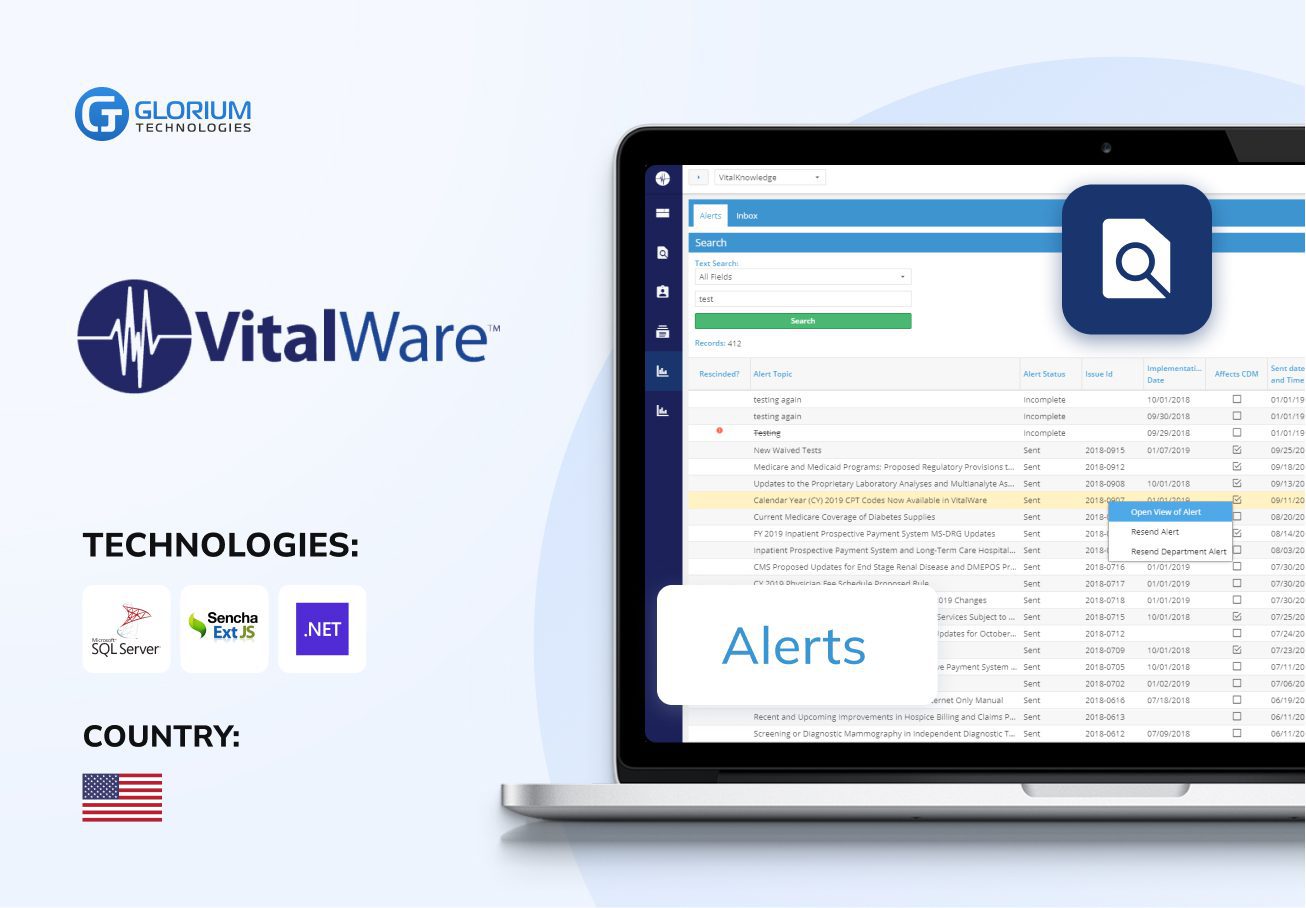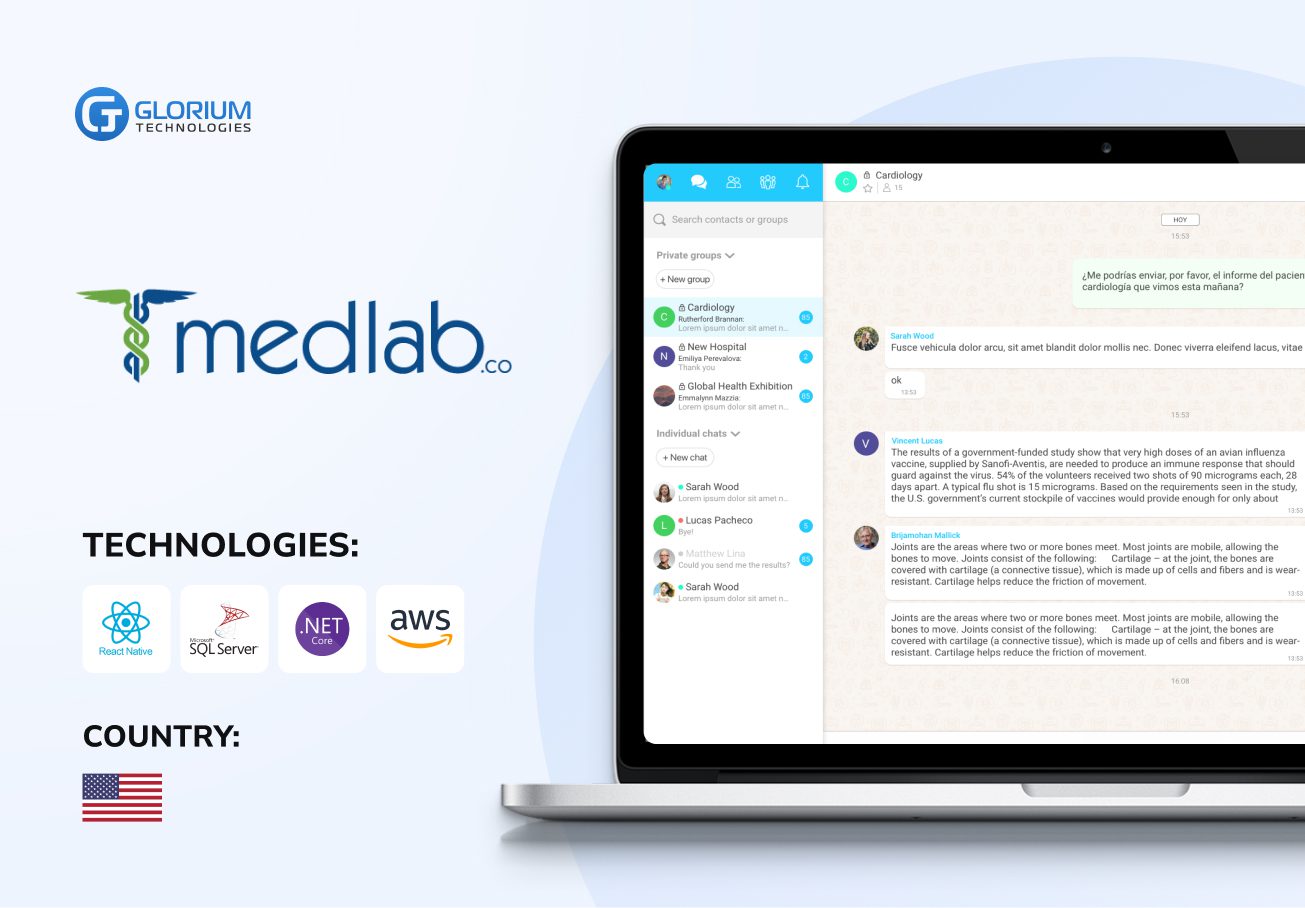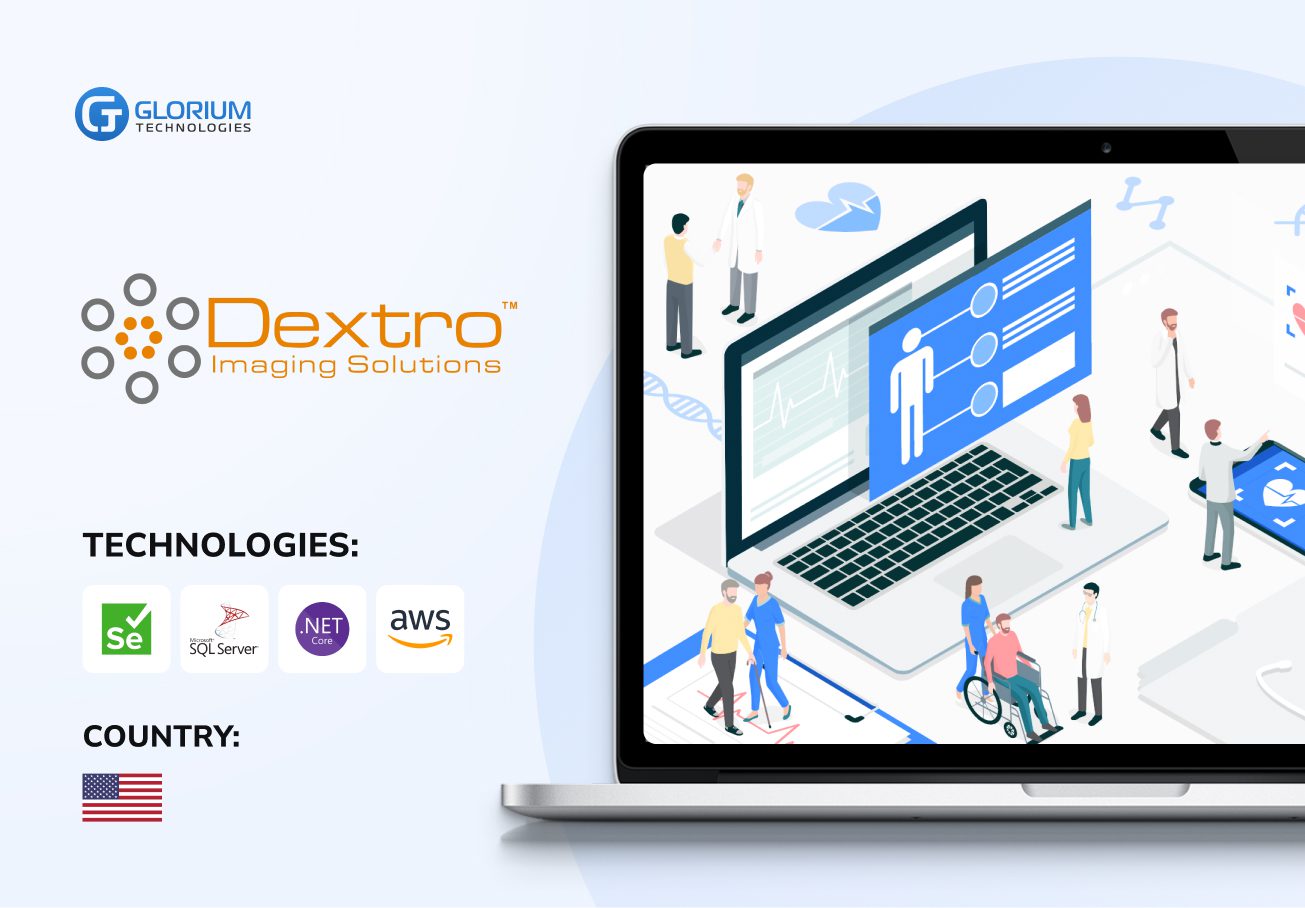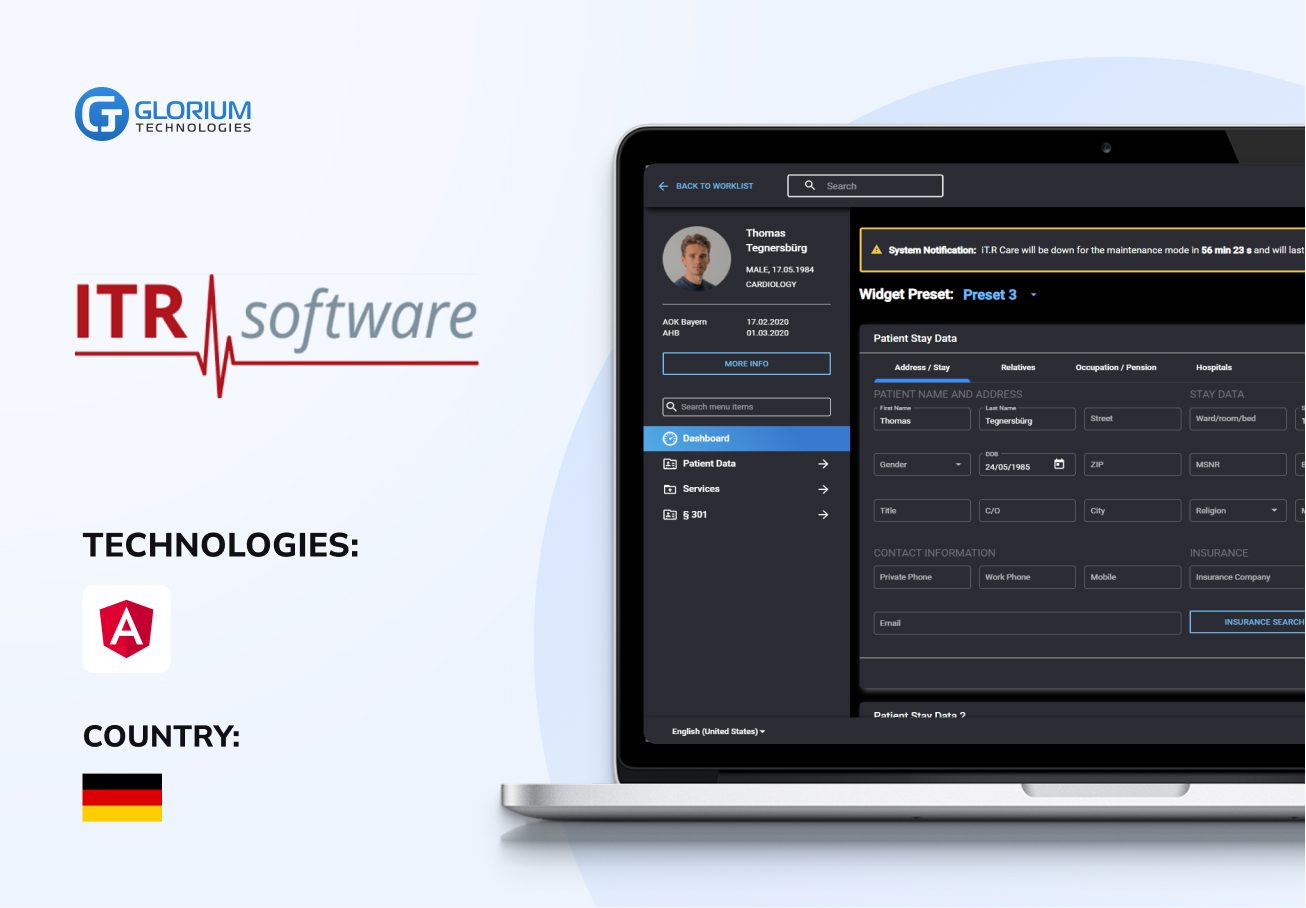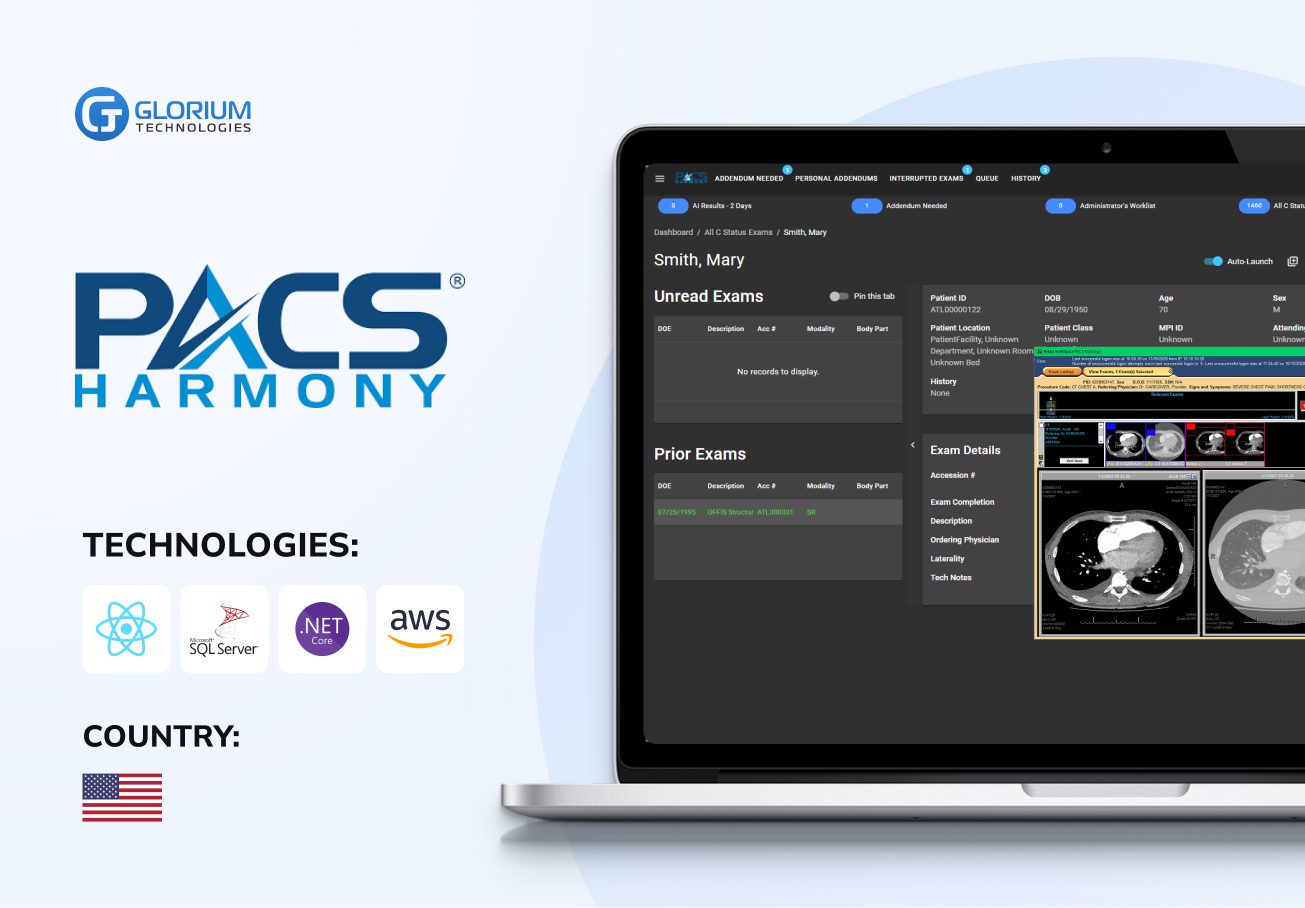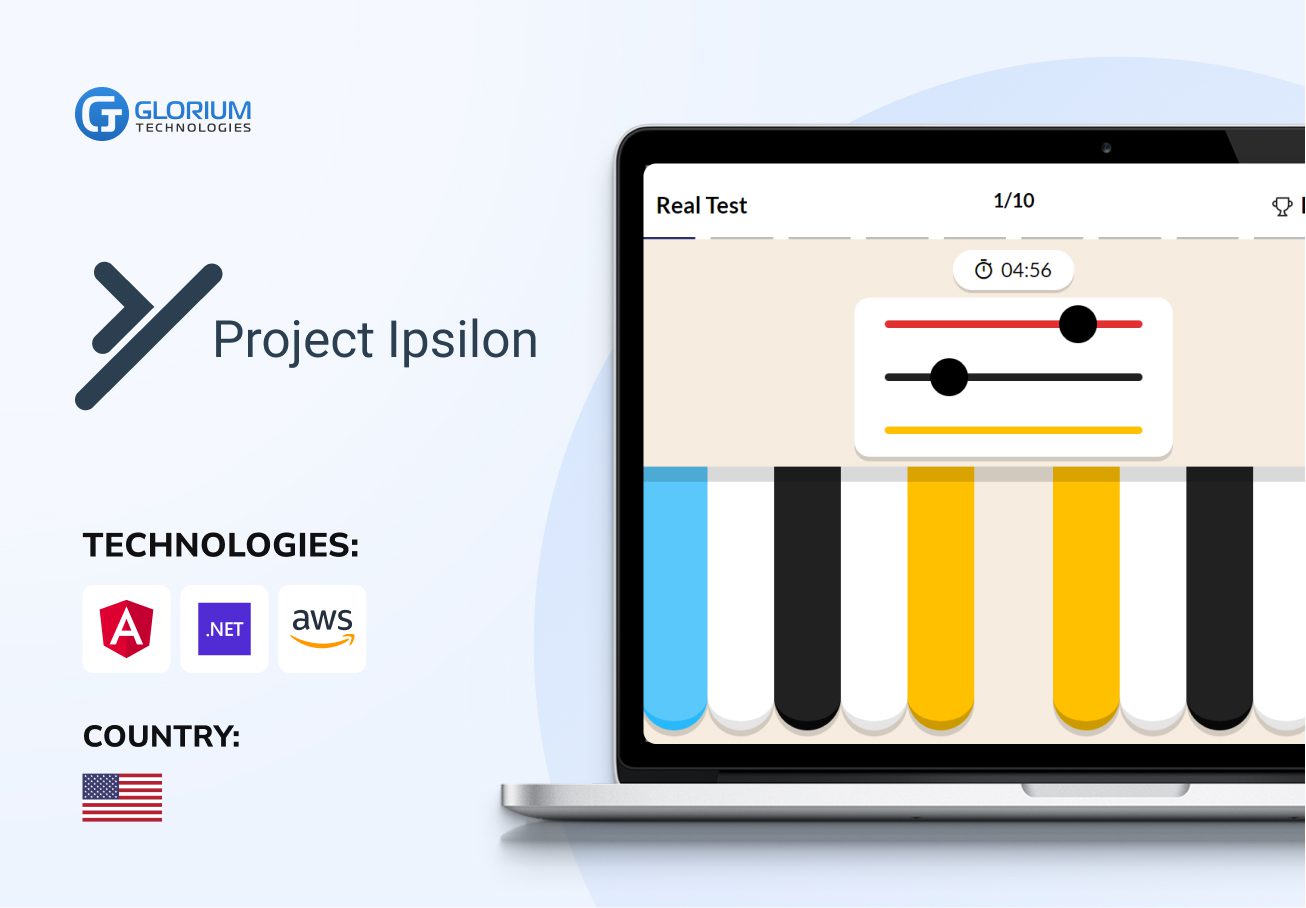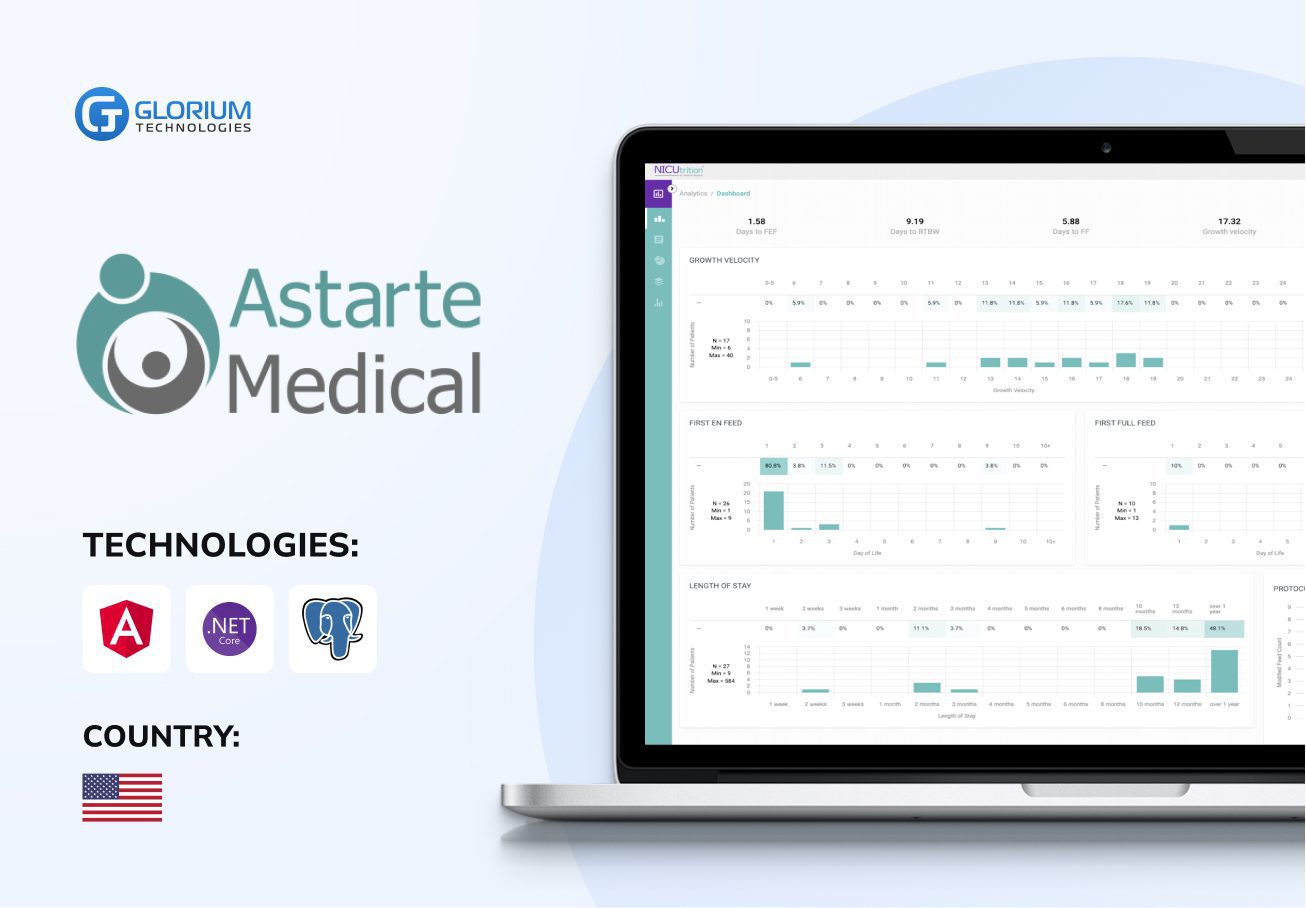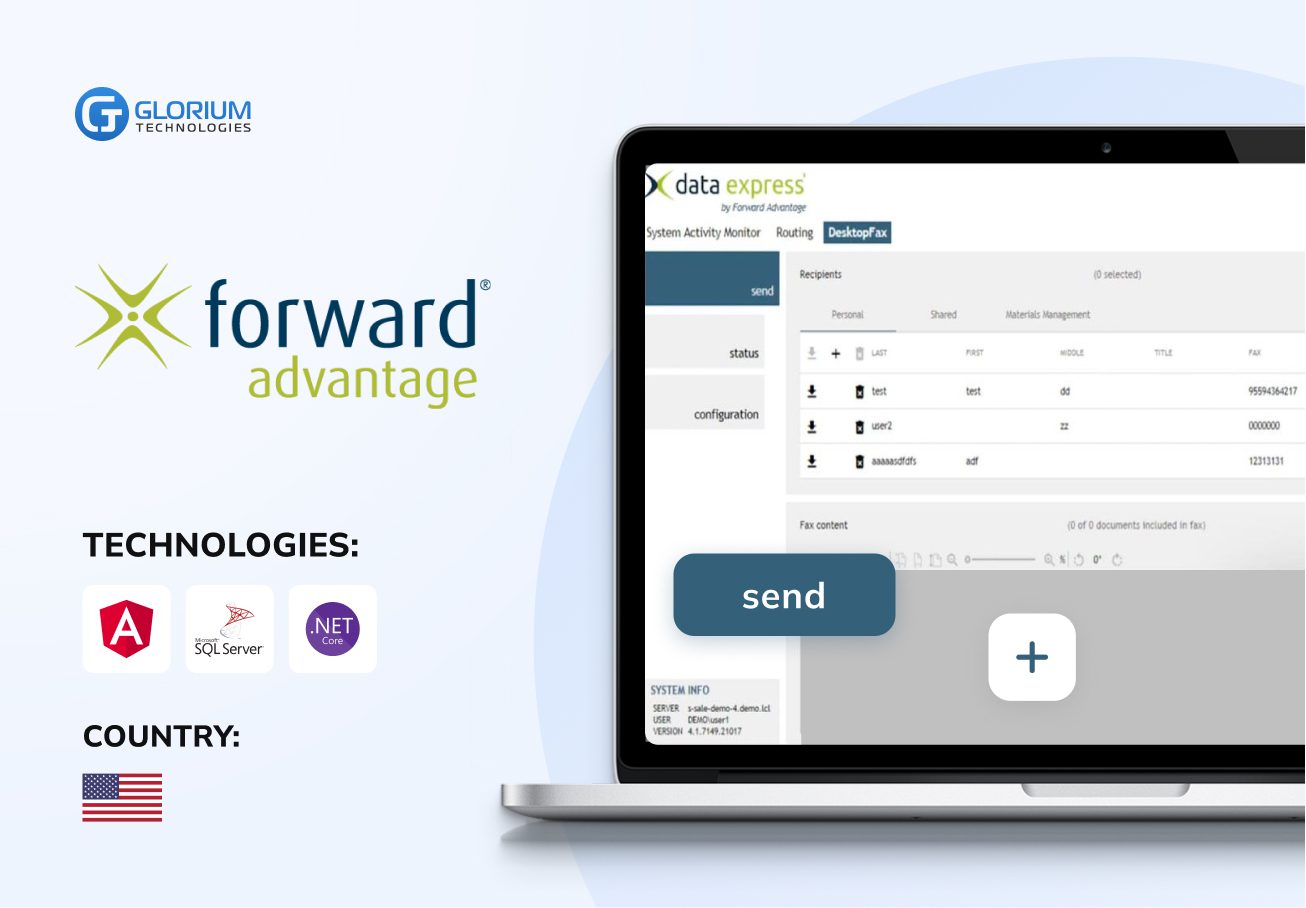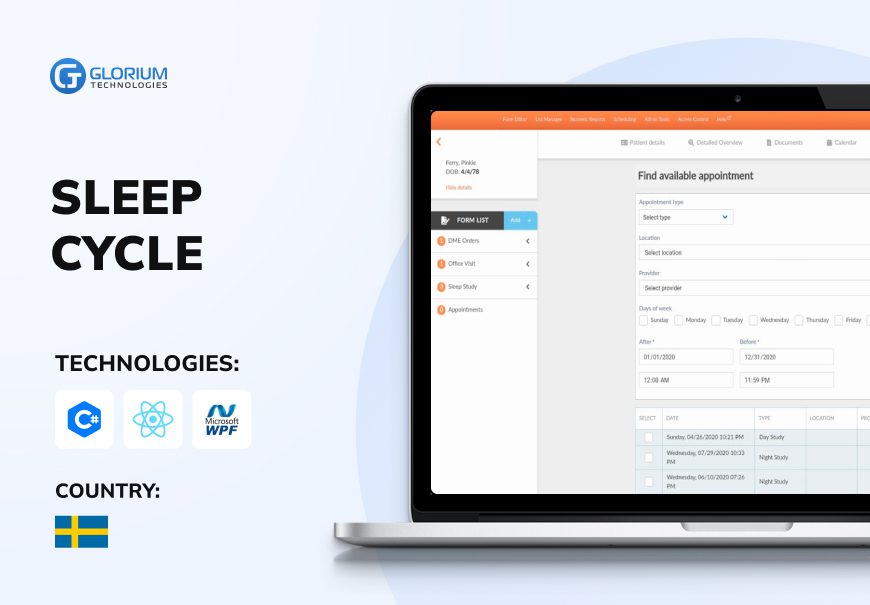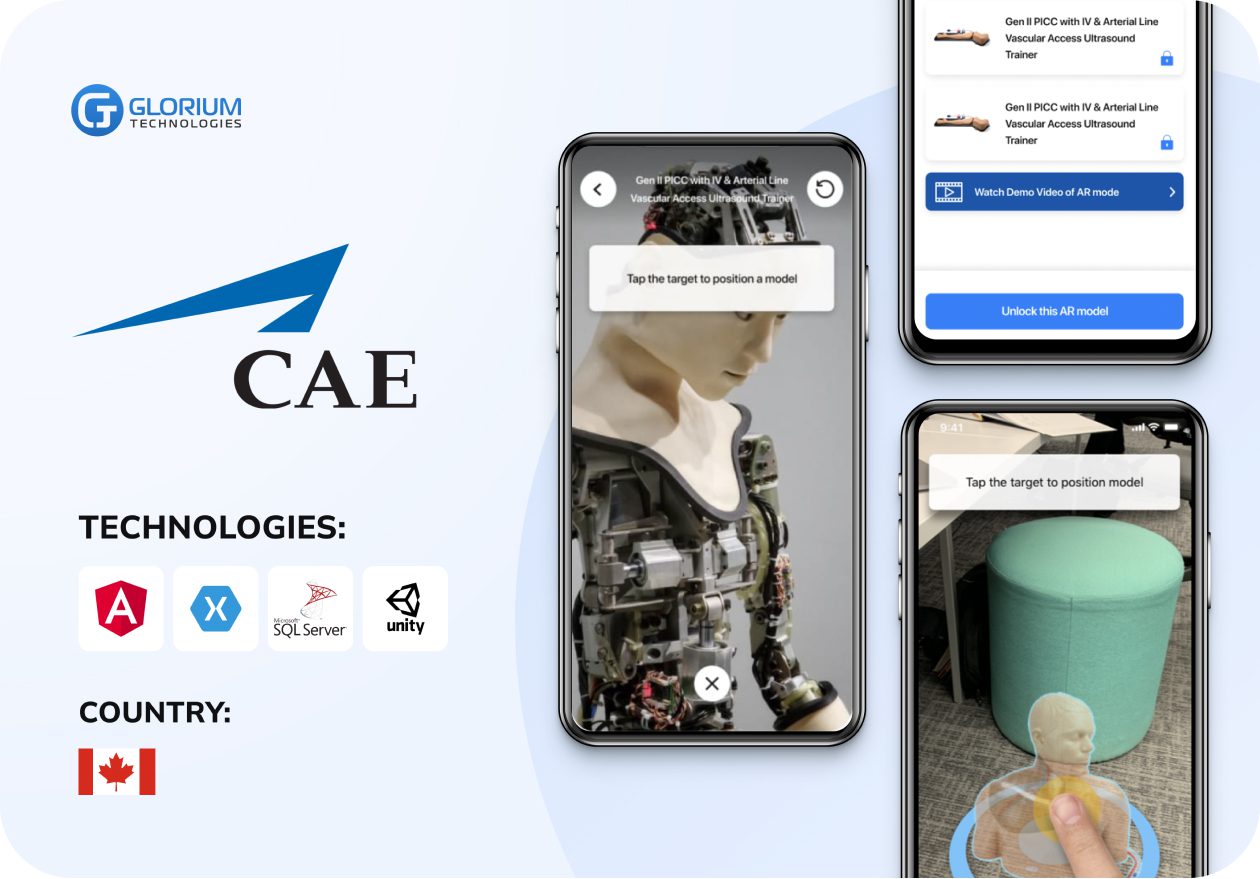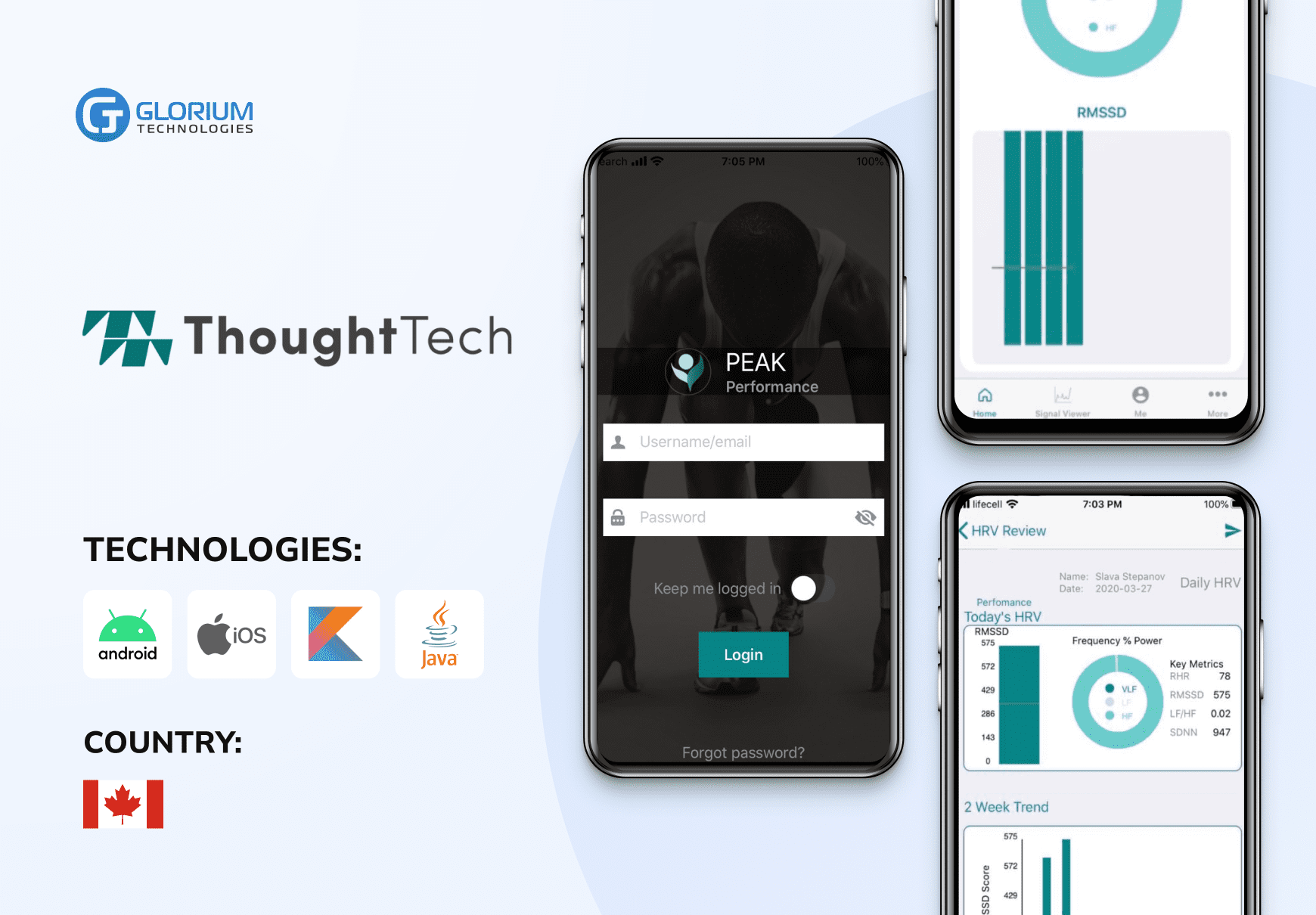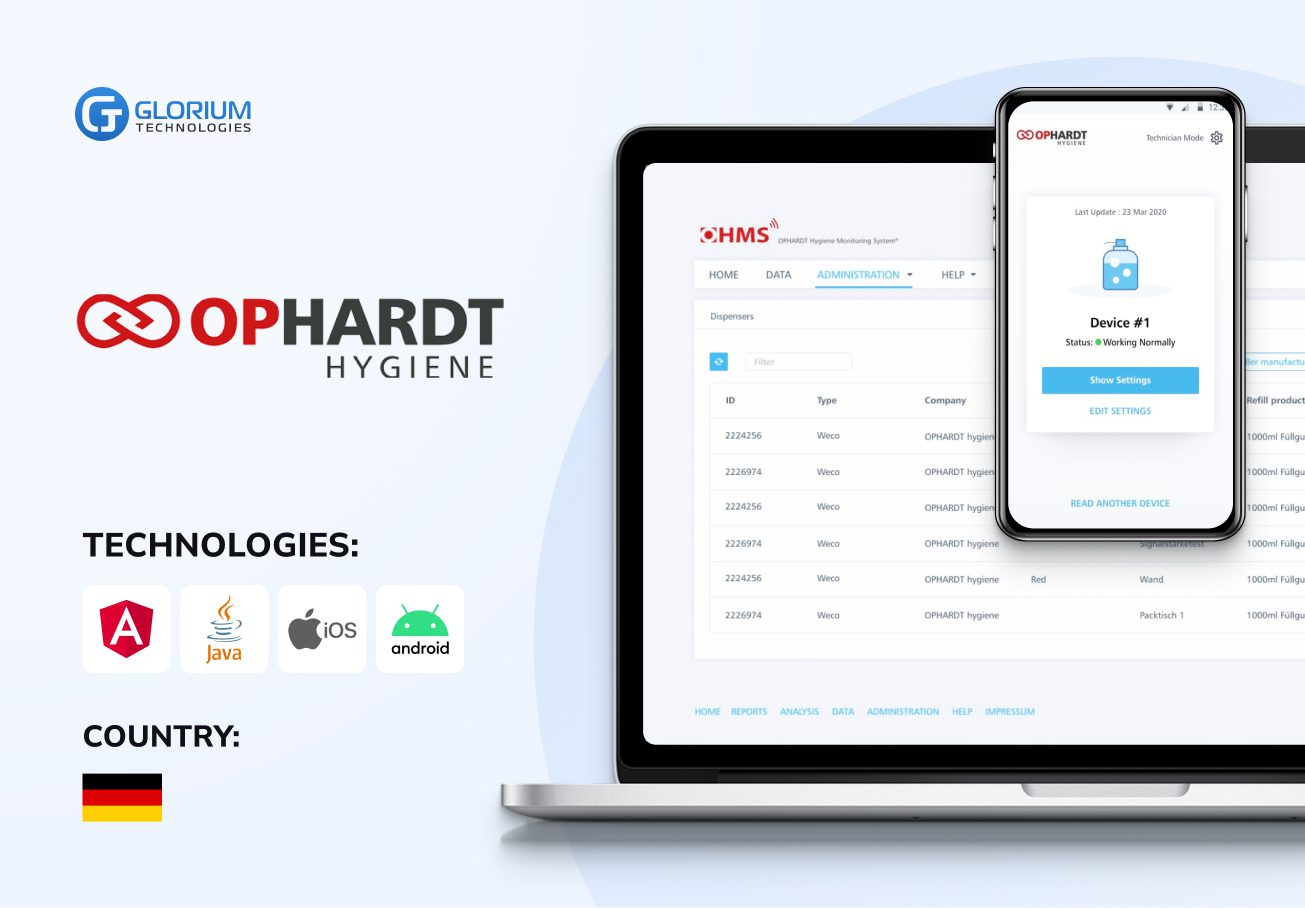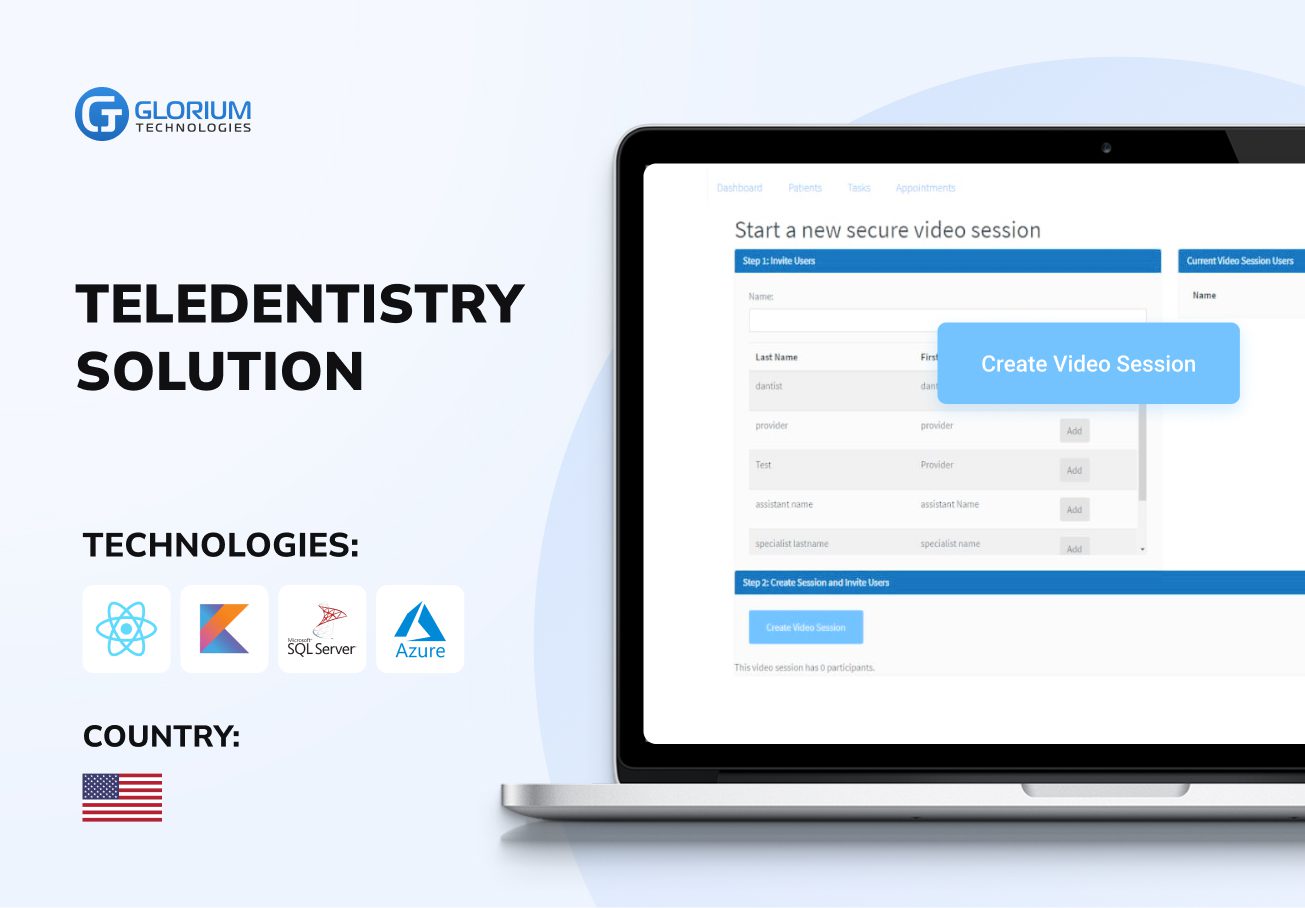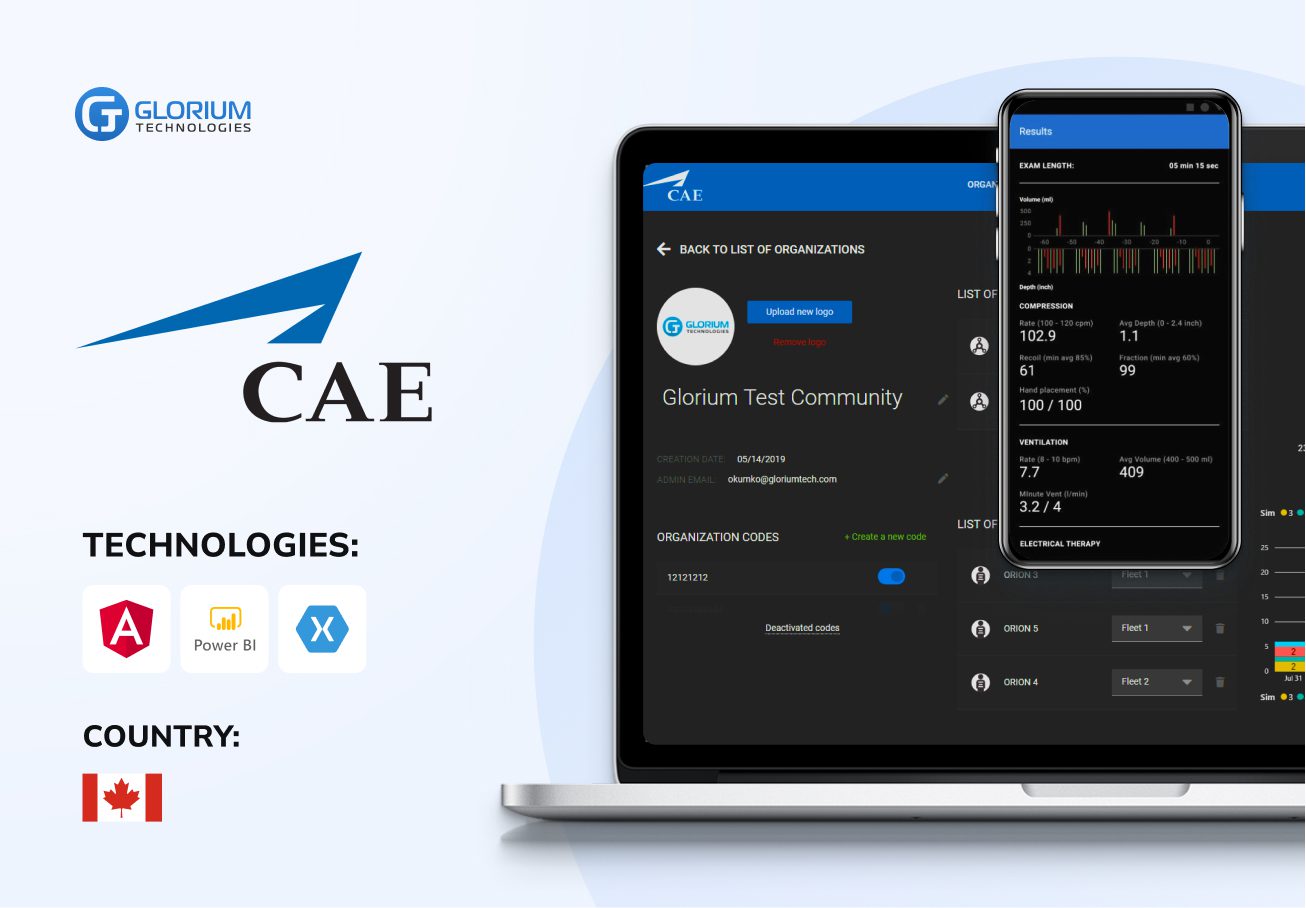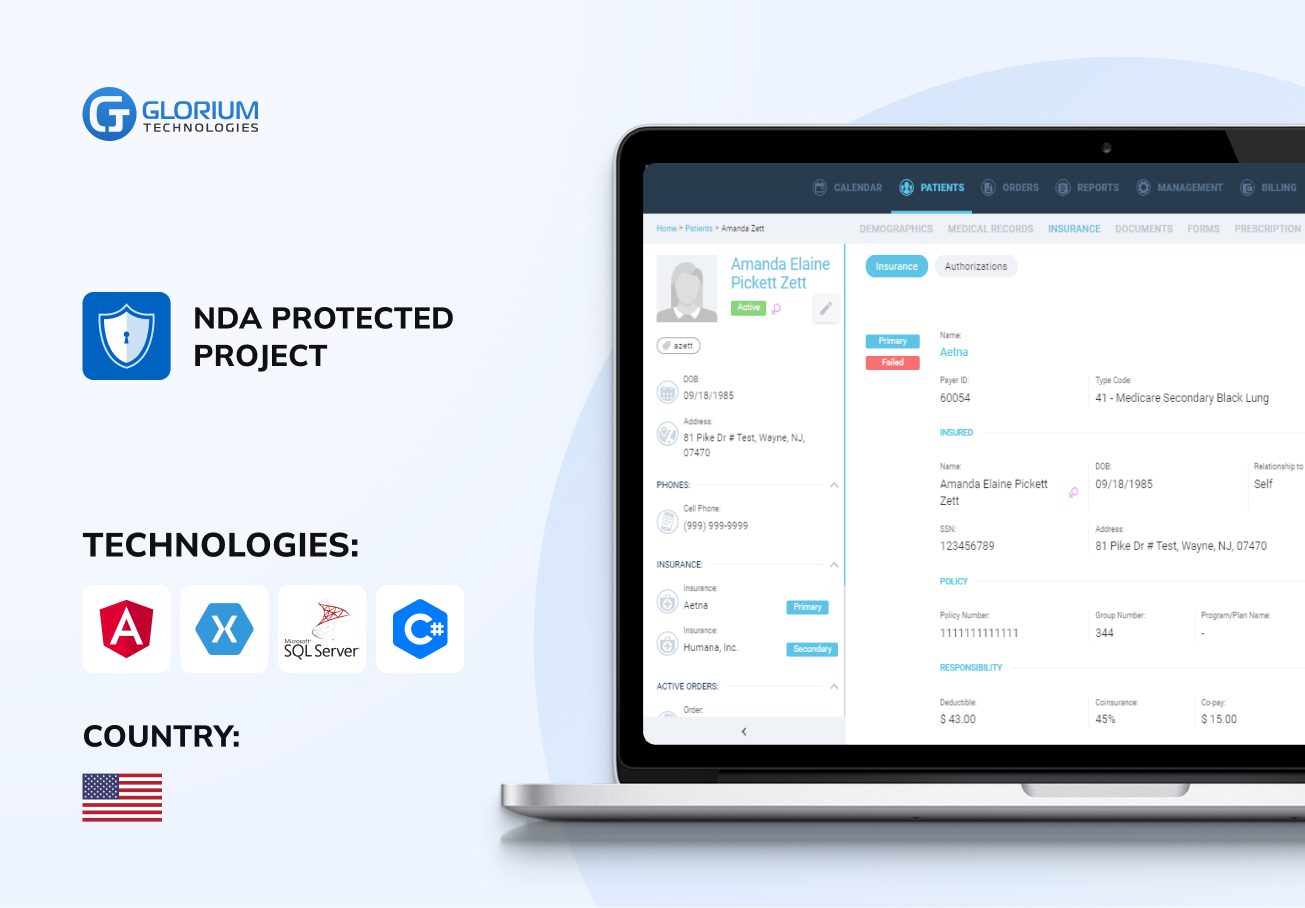Enterprise Software Development Services
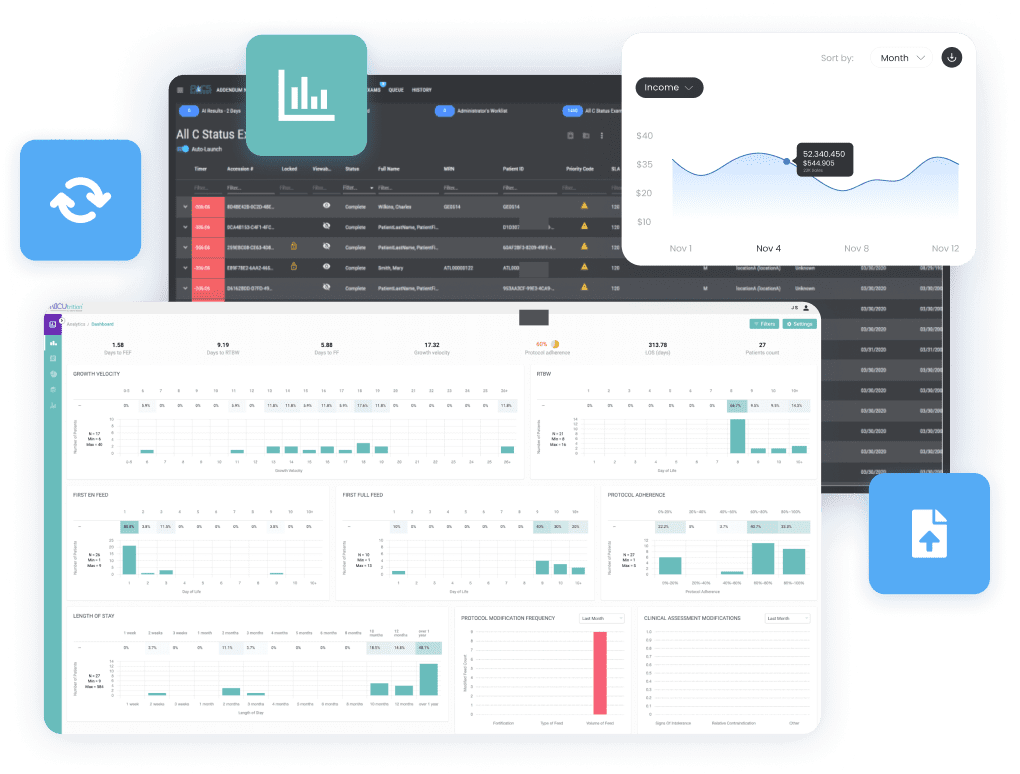

Plan Your Budget Confidently.
Choose Your Starting Point

Solutions We Develop to Solve Your Biggest Business Challenges
Personalize Your Software and Enjoy Benefits Our Clients Do
Clients Choose Us for Our Focus on Results
Our Roadmap to Building High-Quality Custom Software
Trusted by Companies across Different Industries
What our clients say about us
Our clients journeys
Who we are
About usGlorium Technologies is a full-cycle app & software development company which covers specific client business needs and manage them with the help of the best possible technology solutions.
Since 2010, we have been inventing digital breakthroughs, helping startups and businesses come out on top in their markets.

Why choose us
Let's Connect!
Enterprise Software Development: a Comprehensive Guide
We understand why you’re looking to learn more about enterprise software development. It has become an essential part of modern business strategies, and more than 80% of companies have already integrated custom solutions to automate tasks and achieve growth.
Enterprise CEOs and CTOs prioritize integrating enterprise systems because they want to enhance efficiency and ensure scalability. In fact, 59% of CTOs believe that product synergies and governance are drivers for growth; to this end, they link enterprise software to synchronize research and development activities and improve overall business management.
Custom enterprise software development brings various advantages to companies, including improved productivity, better resource allocation, and scalability. In this guide, we’ll explore the benefits of enterprise app development and the necessary steps for successful growth. We’ll also approach seamless data integration and compare enterprise systems with traditional software solutions.
Why CEOs Prioritize Enterprise Software Development?
Introducing advanced technologies in companies isn’t a new trend. We’ve collectively tried to digitize our workspaces and automate redundant tasks for years. Why is that? Enterprise software simplifies workflows and solves challenges associated with large enterprises. It’s a no-brainer that CEOs and CTOs introduce these solutions step-by-step.
Enterprise software is a solution designed to understand and solve the challenges of large companies associated with sales management, customer service, personnel management, data analytics, and more.
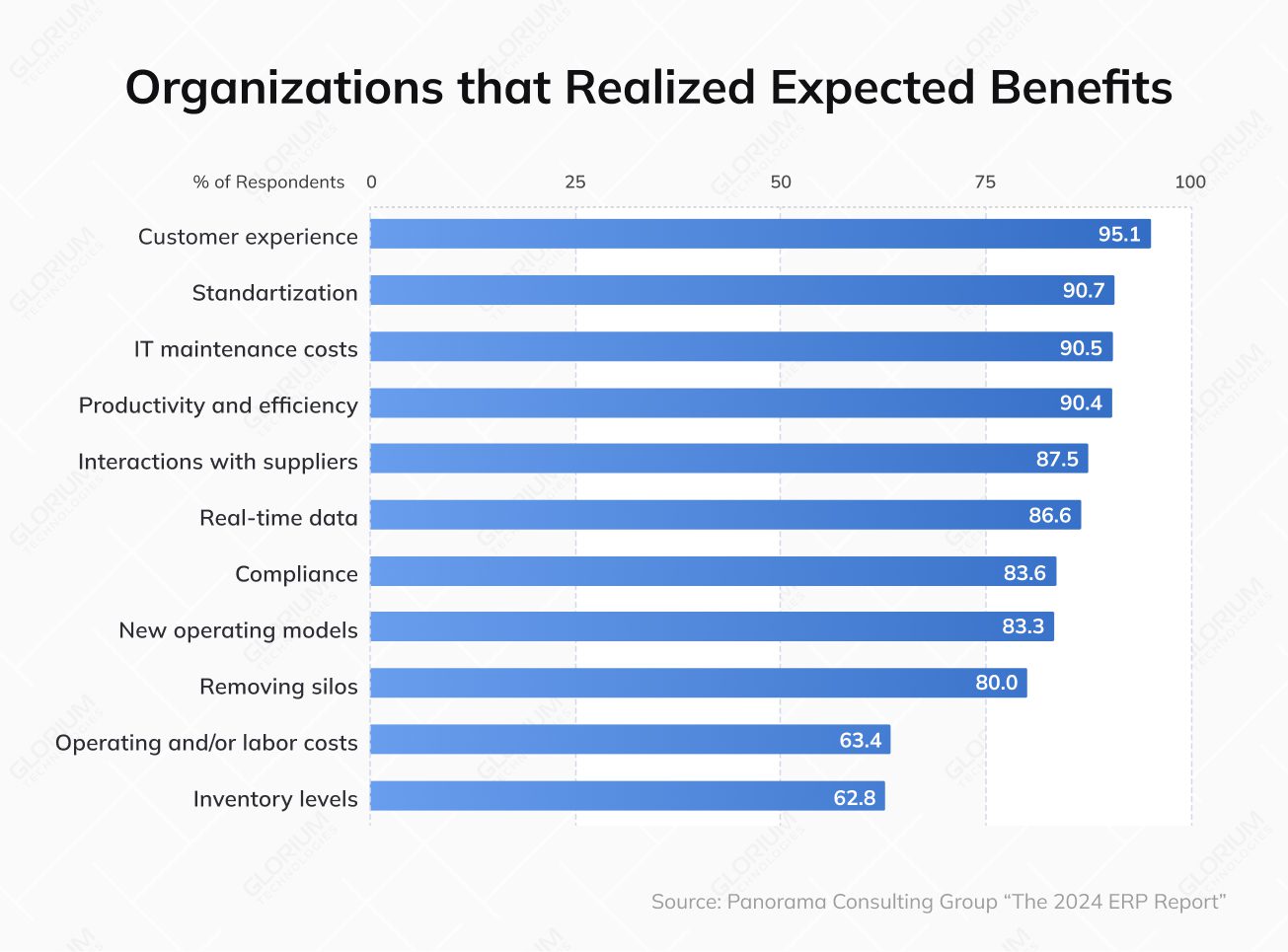
According to the ERP Report 2024, companies set specific goals and expected benefits, such as improved customer experience, standardization, better compliance, inventory management, customer relationship management, etc. CEOs and enterprise stakeholders prioritize custom enterprise systems since they offer a wide range of benefits.
If you’re constantly looking for ways to streamline your business operations and stay ahead of the competition, custom software is a great option. Custom enterprise software is developed for the processes of a particular company and is easily supplemented with new functions if needed. Off-the-shelf software often causes problems during scalability and contains only standard functions for business operations.
Anna VoznaClient Success Manager, Glorium Technologies
How Enterprise Software Helps Your Company Succeed
Custom enterprise software is designed specifically to meet the needs of your business. And that’s not all!
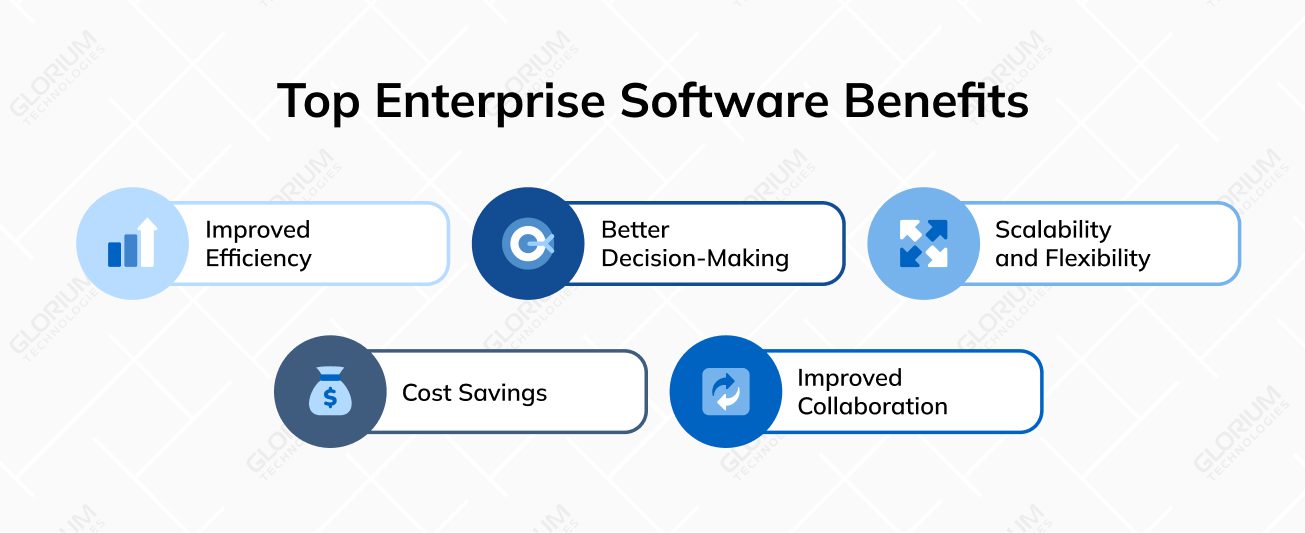
- Improved Efficiency: Enterprise solutions usually automate some redundant tasks that can be delegated or reduced. These solutions minimize manual work and allow your employees to focus on more strategic activities
- Better Decision-Making: Enterprise-grade software provides real-time data and allows you to make decisions faster and correctly
- Scalability and Flexibility: A custom-made enterprise solution grows alongside your company
- Cost Savings: Improved efficiency and optimized processes reduce operational errors and lower costs
- Improved Collaboration: They also centralize data storage and exchange, making collaborative tasks more accessible
Must-Have Tools in Every Enterprise Software Suite
The tools your enterprise solution will have depend on your company’s needs and challenges. However, we recommend including these essential tools that enterprise apps benefit from.
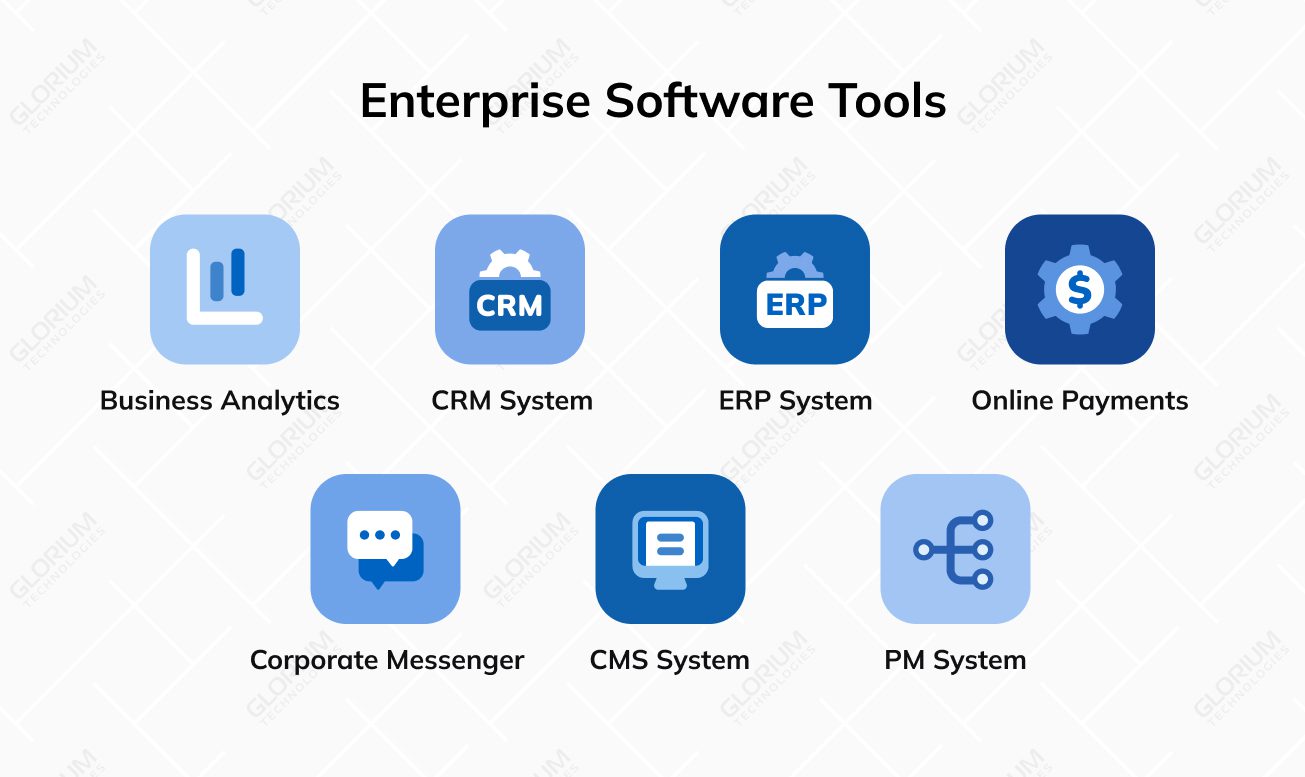
- Business analytics: Facilitates data analysis and its management, tracking, reporting, visualization of statistics, and sharing with other company departments
- ERP system: Its components enable supply chain management, financial management, warehouse management, employees and suppliers. It also facilitates an effective data consolidation process from different enterprise applications into one system
- Online payments: With this tool, your company won’t have the need to collaborate with third-party services for financial transactions
- Corporate messenger: Corporate messenger eliminates the risks associated with discussing work matters and business outcomes via social networking apps
- CMS system: This tool will help you create, publish, and distribute content on your website and social networks for better marketing
- PM system: PM systems help you organize tasks and processes
- CRM system: These systems allow you to store and manage customer information, form better relationships with them, and offer more personalized services and campaigns
These tools are just a fraction of what enterprise solutions can do. Read more about the features and benefits of these tools, especially if you’re looking to build custom CRM.
Enterprise Software Development Trends in 2024
It’s not enough to develop new technology and integrate it; you must also follow contemporary trends that make this technology even more powerful. Let’s explore some of the most significant trends currently affecting the enterprise tech development market.
Artificial Intelligence
The introduction of generative and predictive AI tools shifted our approach to mundane and routine tasks. This technology has allowed us to free up time and focus more on strategic decisions and functions. For enterprises, AI makes it possible to:
- Generate personalized customer offers
- Improve communication with customers through AI chatbots and assistants
- Cutting down recruitment time by half with automated candidate selection and scanning
- Process written and voice messages
- Suggest and produce various forms of content
Grand View Research published a report highlighting that the global AI market was valued at around $196.63 billion in 2023 and is expected to grow by 36.6% annually from 2024 to 2030.
Statistics aside, the effect AI has on our approach to both content generation and market forecasts is quite apparent.
Cloud computing
In 2024, cloud computing continues to be a prevalent trend in enterprise software creation. It provides businesses with flexibility, scalability, and cost-effectiveness because they are able to use the computing resources on the internet. They make it easy for a company to expand as it deems fit, help to cut the expenses on infrastructure, and also help in increased collaboration since data and applications can be accessed from anywhere. Cloud computing is an integral part of the current solution for enterprise applications, and it can work with other technologies, such as artificial intelligence and big data.
Internet of Things (IoT)
IoT has been and will be prevalent in enterprise application development. This technology connects physical devices and allows them to communicate through a shared network, making data integration and real-time access even easier. For example, a truck motion sensor that tracks location and route sends data to the company’s logistics department.
Blockchain
Companies usually employ blockchain technologies to record transactions and store them safely, making data more accessible in real time.
Experts have observed significant global blockchain technology market growth in recent years. It was valued at $17.6 billion in 2023 and is predicted to reach $1,879.3 billion by 2034, growing at a compound annual growth rate (CAGR) of 52.9%.
Custom vs Off-The-Shelf Enterprise Software: Optimizing Business Processes
When it comes to enterprise software development, you have a choice between creating a personalized solution or buying an off-the-shelf version. The choice depends on your preferences and the company’s needs and challenges. Let’s explore the difference between custom development and ready-made products to help you make a decision.
Off-the-shelf enterprise software
Digital products are always available in ready-made forms. This usually comes in handy for companies looking to quickly evaluate their new tools or those with minimal scalability and customization requirements. Oracle is one of the best examples of off-the-shelf enterprise resource planning solutions.
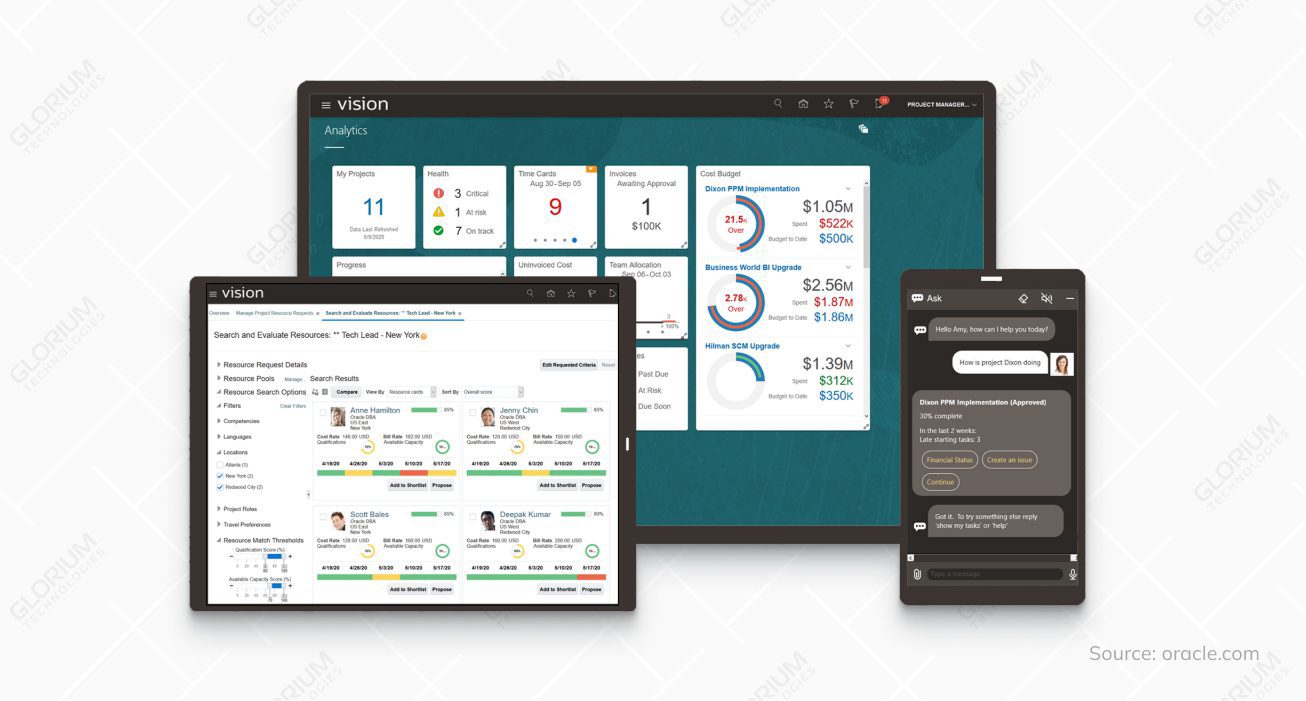
However, off-the-shelf apps don’t have scalability and can’t grow alongside your business, unless the seller requests extra costs for scalable versions. They can be quite challenging to customize and include specific, advanced features necessary for your company (ex, better customer relationship management).
Custom enterprise software
We always say that the best fit is custom. The saying fits all industries well; enterprise solutions especially require a customized approach. Customization guarantees the integration of advanced features, higher levels of personalization, and scalability.
Some company owners see custom solutions as a bit pricy. While the initial investment may be higher than buying an off-the-shelf product, custom apps offer long-term cost savings and a competitive advantage.
Custom Enterprise Software Development: 7 Main Steps
Understand that custom solution development is a complex and lengthy process that requires professional attention. Here’s a brief overview of the whole development process that our professionals often follow:
A comprehensive business analysis
The first stage is for introductions. At this phase, you must collect all necessary information for your enterprise software development project, including business goals, market research, competitor research, competitor solutions, etc. If you work with a development team, they’ll study this data and prepare a detailed roadmap for your development project.
Collecting technical documentation
At this stage, your development team should be ready to collect technical documentation and, based on your requirements, offer a suitable tech stack, mandatory functions, advanced features, and scope of the work. You’ll also find out the project’s initial budget.
UI/UX development and testing
This stage includes creating a friendly user interface for smooth navigation and better customer satisfaction. Testing is also necessary for this stage to observe how easy it is to navigate through suggested designs. This stage is necessary to create a suitable user interface.
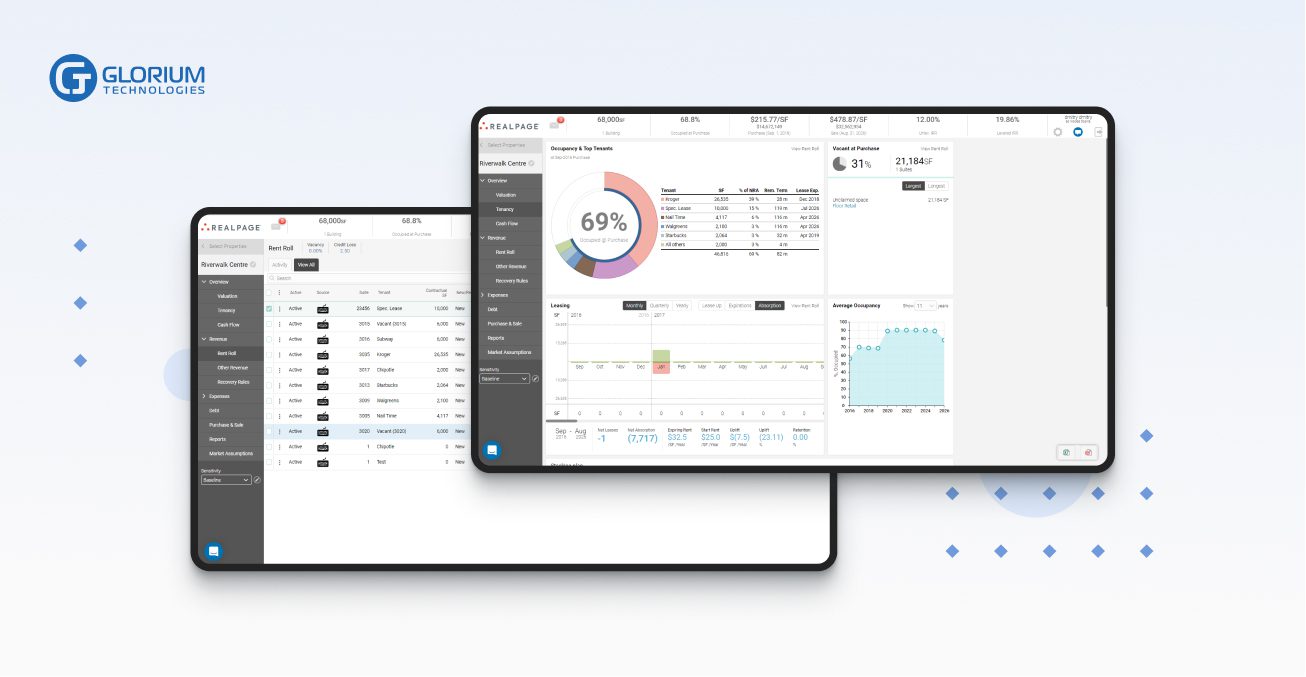
Enterprise software development
After you know what your app will look like, your developers will start writing code and building the enterprise software. This is the stage where a pre-planned tech stack is used, and your engineers implement the desired features.
Product testing
Once your developers have the code ready, QA engineers will start simulating real-life scenarios and engaging both manual and automated testing techniques.
Launch and integration
At this stage, your product should be ready to be deployed and integrated into the pre-existing systems. This is where your software receives real user feedback, which is then gathered by professionals and used if needed.
Post-release support and maintenance
If you’re planning on working with a professional development company, we recommend finding a vendor that offers post-launch support and maintenance. Enterprise software system is complex even when integrated successfully and smoothly. It requires regular updates and adjustments for scalability.
Read more details about how we approach software product development.
How to Find Enterprise Professional Software Developers?
Finding professional and reliable enterprise software developers is challenging, especially in an overcrowded job market. If you’re set on hiring an in-house developer, you can go through these three channels to find one:
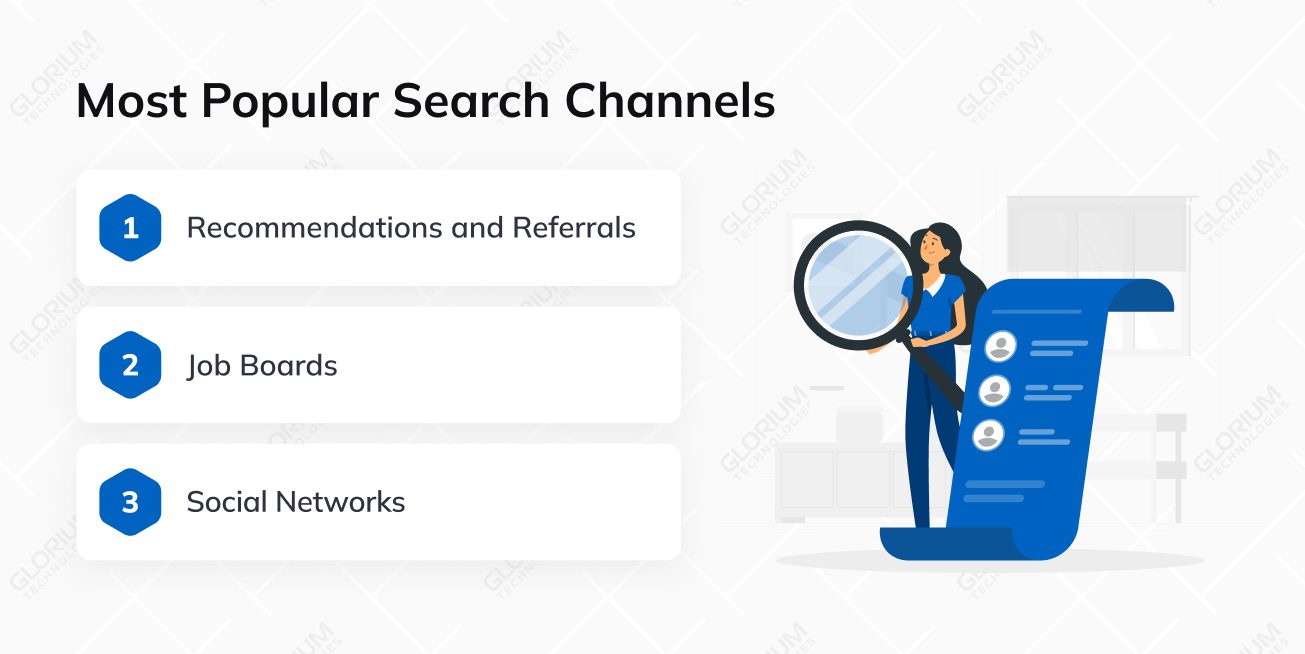
- Recommendations and Referrals: This is a fast and reliable method, although can be a bit biased
- Job Boards: Post a job offer on boards and wait for resumes. This is a lengthy process with high employee turnover risks
- Social Networks: LinkedIn and other professional social networks offer direct connections with enterprise software developers. Hiring from these platforms will also take a while
If you’re looking for a more professional approach to your enterprise software development, we recommend working with an enterprise software development company like Glorium Technologies.
How can Glorium Technologies Help?
We at Glorium Technologies have been helping companies improve redundant administrative workflows for 14+ years. Our clients enjoy flexible collaboration models and transparent pricing. They also enjoy custom enterprise software system designed specifically for their company’s requirements. We’d love to hear about your vision and offer you our roadmap to your success (designed for you).
If you have any questions that our service page and FAQ can’t answer, schedule a free call with our experts.
Insights From an Outstaffing Company
What is the difference between enterprise software development and regular software development?
Enterprise software development is the process of developing large-scale and complex systems for large companies only. It usually interfaces with other company applications (such as ERP or CRM) and manages several procedures within departments. On the other hand, recurring software development is much more common and results in creating small and relatively uncomplicated applications for an individual or a small company who does not need any extensive and intricate modifications and connections.
What technologies are used in enterprise software development?
Java and C# are the usual programming languages used for backend, Spring and .NET as frameworks, AWS and Microsoft Azure as cloud services, and SQL Server and MongoDB as databases to manage big data. They make it possible to have scalability, security, and flexibility when developing complex business applications.
How long does it take to develop enterprise software?
Development time depends on various factors, including the complexity of the software, amount and type of the features, and more. Usually, standard app development can last from 6 months to a year (sometimes even several years, if support and maintenance is requested).
How much does building custom enterprise software cost?
The price of custom business software development depends on the company requirements, team members, complexity of the software, number and level of features, and more. The price also varies depending on the location of your team. For example, if you hire developers or a development team in the US, you’ll pay quite a bit more than hiring Eastern European development teams.




